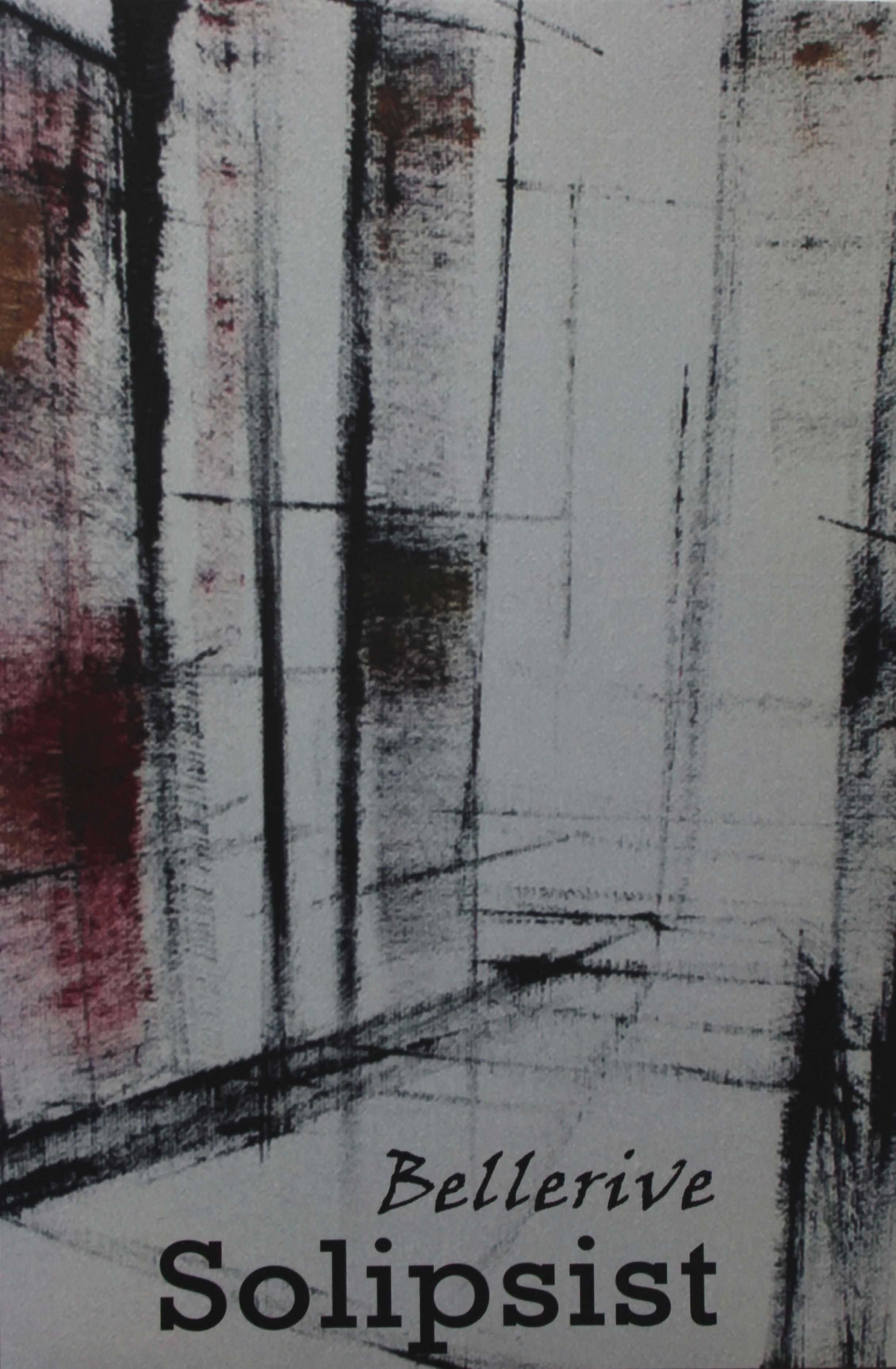

Solipsist
Bellerive 2014
Issue 15 solipsist
1. The philosophical theor y that only the self exists, or can be proved to exist. 2. Extreme preoccupation with, and indulgence of, one’s feelings, desires.
Cover Ar t: Sharp Corner Mike Renez Pierre Laclede Honors College University of Missouri—St. LouisStaff Acknowledgments
Ar t
Ryan Brooks
Emma Figueroa*
Sarah C. Gill
Editing
Peter K. Benoist
Nicole Bonsignore*
Madison Emerick
Samantha Kolar
Benjamin Luczak
T homas S. Mays
Melissa Somerdin*
Layout
K atr yn Dierksen
Marie Kenney
Amber Scholl*
Public Relations
Bekah Cripe
Anna Glushko
David J. A. Niemann
Brian E. Pickens*
Faculty Advisor
Geri Friedline
All members of the staff par ticipated in the selection process.
*Denotes committee chair person
Letter to Tigger, Private Ear
Jessie EikmannW hen you can’t see the w oods Cause ther e ’ s too many tr ees, And you can’t find the needle Cause the hay makes you sneez e . . . Ne ver f ear. Tig ger the Pri vate Ear Is her e. From “Eeyore’s Tail Tale”
After seventeen years, Mr. Private Ear, I have a case for you. Put on your Sherlock cap And patchy cloak. I promise this is the case of your career.
I’m sure you remember Blinking through your magnifying glass At a pair of blue eyes, Blond-headed bowl cut, and Overalls stitched in your imag e, Pacing the public restroom f loor, Imitating your wet lisp And car toonish spring-ste p To ever y unsuspecting patron Of the stalls.
Please find the bathroom actress. Trace the gumshoes back T hrough g roaning escapades, Sweet nothings dribbling from wet lips. Follow the clue: a r usty Sterling ring wedg ed on the fing er, T hen discarded, cleaned of prints. I beg, find the self that can resist Pussyfooting in the gutters.
And promise me, Tig g er, T hat even if you must Plaster the town in cr udely drawn “Wantid” posters or devise an Elaborate trial to convict my libido, You’ll “leave no stone underdone”
Looking for your gig gling big g est fan, Because my nostrils are clog g ed With vulg ar hay, And the trees are blocking my view Of the Hundred Acre Wood.
Maybe the Bonobos will succeed when it all comes to a head, and Africa welcomes Nor th America and Europe to her chest, memories of voyag es lost to the winds the temples will house questions to our writings
as to how communication failed even the wisest of apes, languag es unspoken felt in an embrace.
Perhaps, hiding in the forests where howls will be heard from a distance, there will be sightings of some missing link with answers that will g o uncounted, a member confined to the shadows and to the dark.
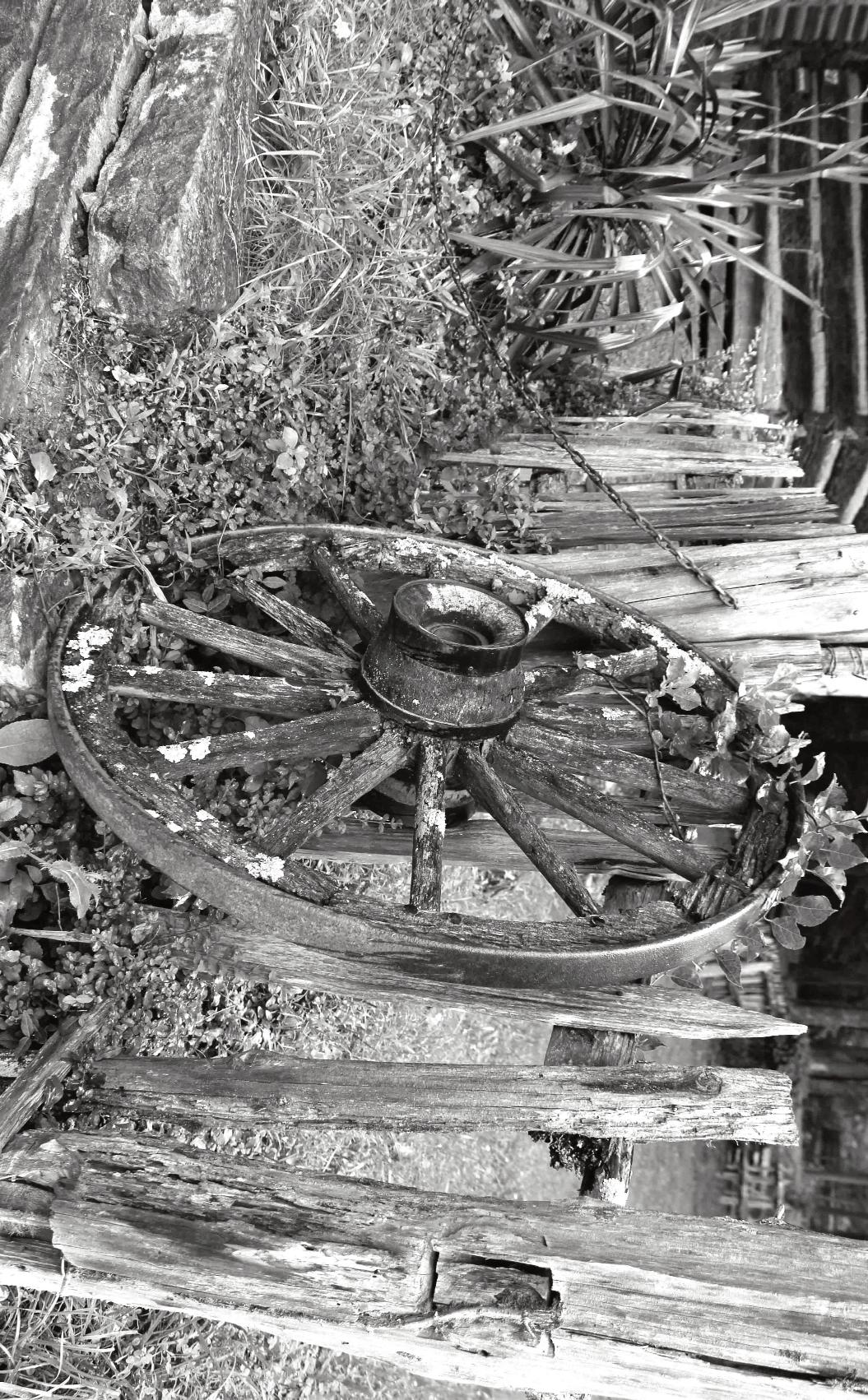
He sits
Maintenance
Kaylyn BauerOn the g round with legs spread out Attaching the wires, Working with his hands timid but with the ease of an ar tist.
Sur veying the faces, Colleg e life in naked for m, He sees more than they for the hands of the future g rasp them tightly commanding their attention.
Oak Kitten
Emma Figueroa
Do not aver t your stare as I scamper into traffic for the lone acor n thrown by your branches. And when the tire nearly claims my tail, I’ll pretend I never saw the ill-fated others, later scraped from the pavement for your licks of laughter. Adjust your smirk as I scur r y back into the safety of your knothole, the acor n harbored dee p within my cheeks, where the jeer of your eye cannot penetrate. T he same acor n will fatten me into hiber nation, where I will rest in the chokehold of your boughs until the fr uit of your limbs reg enerates, and I per petuate our morbid ear thy spectacle.

Bar tleby Was a Smoker
Ena Selimovic
Dreams feel real. Last night: my foot on the g as, the seat too close to the wheel, my legs awkwardly slanted. T he car approaches a shar p tur n, but I cannot g et my foot off the g as. Only just before does it edg e its way to the brake, and then only to press g ently. And it is at that point that I see from outside the car, and it looks to be nearly f lipping off the road. But I’m okay. I’m outside. And then I wake, and it’s Friday mor ning, nine o ’clock, and there’s a whole day. All I can think is: Dri ving is m y trig ger for wanting to smoke, that explains the dr eam, and, yes, a cigar ette will be nice.
I don’t know when it happened, but scenes beg an to be reminders instead of what they were, which is experience, or what entailed being present in the moment, what would be italicized in the pag es of self-help guides: Being there. Being pr esent. In the moment. I was anywhere, but her e and ther e were off the g rid (and I vowed never to own a GPS in fear of losing or, at this stag e, g aining a sense of place). W hen a song called “All Your Light” came on, I thought of cig arettes (it was about romantic love, which, in my logic, was still more or less relevant). At the g rocer y store parking lot, a woman said to her whining child, “Is it so ver y impor tant that you couldn’t do without it? Are you happy now?” and I recontextualized it: “Is a cig arette so ver y impor tant that you couldn’t can’t do without it?” Ever y scene reminded me: You can smoke a cigar ette with that thought and w ouldn’t that thought be nicer with a cigar ette? Or : How nice of you to notice X. Now, how about you smoke a cigar ette to tur n of f a bit since you ’ ve been so praisew or thily conscious?
W hen they were sitting unlit in their packs, I felt they would be better lit; as soon as one was lit, I already felt nostalgic that its end was nearing.
T hen, I realized, I star ted listening to my mother, which, aside from ref lecting other more obvious problems related to forever-adolescent pride, made me realize she had convinced me: I was addicted. T his was a kind of, you know, problem, maybe.
If the present was a reminder, the past was a sign. Being aware of the reliance seemed to make me even more addicted, whatever that would eventually mean or, to the outside obser ver, already meant. I star ted looking for the first signs. W hen during lunch one after noon my then-boyfriend Brian said, “T he only reason I would smoke is to be able to say, ‘I smoked once, but I quit,’ and be proud of the fact that I could do it,” I thought, This isn’t going to w ork.
And I meant the relationship. W hat he said about smoking re peatedly resurfaced. W hen he asked what happened, told me we had been happy for months (How many? And had we, really? I felt like I still barely knew him. And anyway, what was there to know about someone? T he philosophical questions did it, right? It wasn’t the passing comment about cig arettes?), I said, “You like to make yourself suffer. You ‘work through’ some stupid experiment, and then claim it as g enuine experience. But it’s crazy, you
realize? W hat do you know?”
T hat g ot him. He was furious. I had never seen him ang r y before. It became clear that it was possible we wouldn’t have been happy, or weren’t really, since he couldn’t be himself in full, as he was now, revealing this ferocity. (I never believed that another could make you better than you were; dee p down you always were what you were.)
“For the record” what record? “ you are the actual smoker!”
“Exactly!”
He didn’t g et it, and I wasn’t sure what I was saying. After a pause, neither of us saying anything, he stopped breathing into his phone and said, “I didn’t tell you: I’m g oing through a lot right now. T his is such bad timing.”
“Isn’t ever ything. Email me. I have to g o. ”
I hung up and thought about how g ood a coffee and cig arette would be out on the porch. And then I did just that, forg etting completely about what’s-his-name. And now I think, maybe, that was the first sign. Severing relationships, being impatient, oversensitive, weighing words all these were in self-help guides. I had become a smoking gun.
Reminders tur ned reminiscences into reg retful patter ns. I heard someone else in the way I lashed out at Brian and knew whose words they were.
It was a couple years ag o. At seven in the evening Jack came over after work in the habit of the time, living apar t but tog ether. I had been feeling ill that day, and dinner was unmade. W hile he showered, I g ot out of bed in the oversized nightg own I had g otten into the habit of wearing, opened the fridg e, and stared blankly. I took a dee p breath. T he car ton of eg gs seemed to stare back, and I slid it onto the counter behind me I scooped a spoonful of butter from the second shelf and, having walked to the stove with the car ton of eg gs tucked under my ar m, shook it into the pan (the nightg own shook with me).
It was just after seven when I cracked four eg gs, watched them sizzle as the colors solidified.
I was plating them as Jack, now in his pajamas, sat at the table. He had a fork in his hand when he paused to ask, “Is there any bread?”
W hen I shot a pitifully annoyed look at him, he quickly apologized and said, “I’ll g et it,” but I was already by the cupboards on the other side of the island.
I opened the cupboard next to the fridg e and g rabbed the loaf, cut three slices, and placed them next to his plate.
He quickly forg ot I was ir ritated then and beg an eating.
I went back to bed, tr ying not to notice how loudly he ate.
Ten minutes must have passed when I decided to g et up ag ain. It was clear an argument was set to begin from the star t of the conversation, but it came to full potential when Jack said, “It’s nothing you want to hear.”
I answered, “I don’t know if it makes sense in my head, but I’m relieved.”
Following a quick “W hat?” he looked up from his meal, his fork still
raised.
“It’s women. T here’s another woman. It isn’t your health or family troubles or finances. Anything that matters. I mean, it’s not like we would’ve ever worked out, anyway. We hardly know each other. But anyway. ”
“How do you know that?”
“We’re different. You always wander, and I don’t.”
“You’re full of shit.”
“We barely talk anymore, anyway. I’ve always been ter rified of that. Not having anything to talk about. You know? You see those couples in restaurants and ever yone mentions them. T hose couples who don’t talk anymore. T hey’re even mentioned like this by couples in films who are scared of becoming those couples. You know? And that’s what happened with you and me right at the beginning. I mean, look at this nightg own. And you’re eating eg gs for dinner.”
He was eating ag ain, but slowly, looking up at me between scoops.
Fearing there would eventually be no eg gs left on his plate, I continued, “You were there until you realized the feeling was mutual. T hen you were g one. It was enough for you. I know how it g oes. ”
He remained silent at first, then re peated, “You’re full of shit,” his mouth half-full. He looked down at his food ag ain.
“T hat was just the beginning for me. But it was already over for you. Women.” I remember scoffing with a smile. It didn’t feel like me, like something I would do. I didn’t know what it meant.
“You don’t know anything. W hat do you know?” he had said.
I paused. “Anyway, I hope the eg gs are g ood.”
He broke the silence ag ain, saying, “I actually have to g o back to work in the early mor ning. Inventor y stuff. I thought I’d stop by. I wanted to tell you it didn’t work out between me and her.”
I continued looking at him.
“I thought you’d be happy,” he added.
I didn’t know what to say. (At first, I was distractingly annoyed by the way he held his fork with his right hand in a fist.) I felt like I had cheated someone out of a potentially positive relationship, when I had nothing really to do with it, and when it tur ned out not to be, according to him, positive at all. So I said the only thing I could think of saying: “Well, it isn’t like I ever wanted you to be sad.” W hich was tr ue.
“You’re difficult. Anybody ever tell you that?”
I went back to bed without responding. Or that was my response. I had already quit; it took me nine more months to realize.
W hen he entered the bedroom, he was loud enough that I could pretend he’d woken me when in reality I found slee p taxing, because remembering was the only activity my body seemed to will itself to do, and memories embodied phantom pains. He had no way of knowing, anyway; I was lying on my side, my back to him.
“W hat’s wrong?”
I didn’t answer. I wasn’t ready for what was inevitably g oing to
happen now. I didn’t understand why he had to confront me. I wasn’t feeling well, after all. Perhaps I hadn’t been feeling well for a while. W hat did he know?
I looked to the right with my eyes, as if they could roll back and see, without being noticed, his slightly lifted head, looking at me.
“So? W hat’s wrong?” Hearing nothing still, he implored more ster nly, “Louise.”
I said, “I’m sor r y. I haven’t been feeling well.” W hich was tr ue.
He r ustled to his side, his back to mine, and jolted his half of the blanket.
T hen the car alar m went off.
After five minutes, Jack muttered, “You have g ot to be kidding me. ”
He resituated the blanket, par tly uncovering me, and covered his head with his pillow.
W hen another five minutes passed, I sug g ested it was his car.
“It can’t be. Mine doesn’t sound like that.”
I mouthed, bobbing my head sideways, Maybe it is. W hat do you know? You don’t know anything .
I threw my par t of the blanket to the side and swung out of bed into my slippers.
“I’m telling you, it’s not mine.”
“Well, if it isn’t, I’ll at least see whose it might be.”
“T here you g o ag ain. W hat’s it to you?”
I didn’t want to be in that room with him. W hat was worse, I wasn’t sure why. All this happened quickly. T hen I retur ned to being there, in this then-present moment which required that I react to Jack’s snide remark I stopped at the doorway and tur ned back to look at him, but it was too dark and I couldn’t tell if his eyes were closed. I wished he could see my look. I didn’t want to talk.
I shr ug g ed and proceeded to the next inevitable par t of the scene. But then I couldn’t find his keys. He usually left them on the island as he came in. Still, it didn’t matter. I knew he knew his alar m better than I did (how many times had I heard it in two years?), that it wasn’t his car, but this wasn’t about the alar m anyway. So the faux search pretended to aid results.
T he alar m stopped before I g ot to the front door. I thought I heard the next-door neighbor shutting the door of his house. I retur ned to bed.
“And? W hat did Detective Huffing puff find?”
W hen tr ying to be playful, he was always cheesy ir ritating even (more than his style of fork-holding). Maybe he reg retted what came before. All of it. Maybe I did too. I hit him with my pillow before settling back into bed, unsure whether I would use the g esture to lighten the air or whether there was really no g oing back from what was happening, or would happen.
He laughed, and I then quickly decided: “It was yours,” I said.
I still had my back tur ned to him, but I could feel a chang e; I could see him raise his head and look at me. I reg retted then. I felt heavy. I wanted to sink into slee p.
Instead, I re peated, “It was yours,” feeling his continued challenging g aze. It was all too simple: I had already given up, and he wouldn’t stop me.
“It couldn’t have been.”
“Are you g oing to slee p, or what?” I had no idea what I was doing.
He g ot up. W hen he retur ned to the bedroom, he had his coat in one hand and the keys dangling in the other. I was relieved; I thought he was leaving, but then I remembered this scene revolved around a car and that the keys might be relevant.
Sure enough, he said, “I had the keys the whole time. How’d you tur n the alar m off if it was mine?”
His wanting to prolong the argument ref lected how we had been these past few days weeks? (How many?)
“Now you can’t stand being wrong about a damned car alar m?”
I didn’t want to argue anymore.
“Exactly! Let me slee p already.”
He left the blanket with me, but when he retur ned ag ain, he took his pillow and sle pt on the sofa downstairs. I had a hard time falling aslee p. I ke pt hearing the alar m. I ke pt hearing Jack say, “W hat do you know? You don’t know anything.” I wanted to ask him if there was somebody else still, if it was working out, if he wanted me to make some eg gs, knowing he had already eaten, knowing he would say there was nobody, and then to tell him, “I hope the eg gs are g ood.” T hat was all I had hoped for, and it wasn’t enough.
Ever ything came tog ether in a ball of smoke emitting from my mouth, knowing I was addicted, and I felt without within and pr esent, ther e, in the moment at least until the end of that cig arette and the beginning of the next T he in-betweens were hard, but they were hazy anyway. T hings had come to pass, and it didn’t matter what I knew. For the first time, I found something simply ir resistible. I put the kettle on the stove, retur ned to the porch, and thought, I am happy. It is so ver y impor tant that I can’t li ve without whate ver makes me so. I hoped I would have the same dream ag ain that night.
Matt Colonna Alchemy
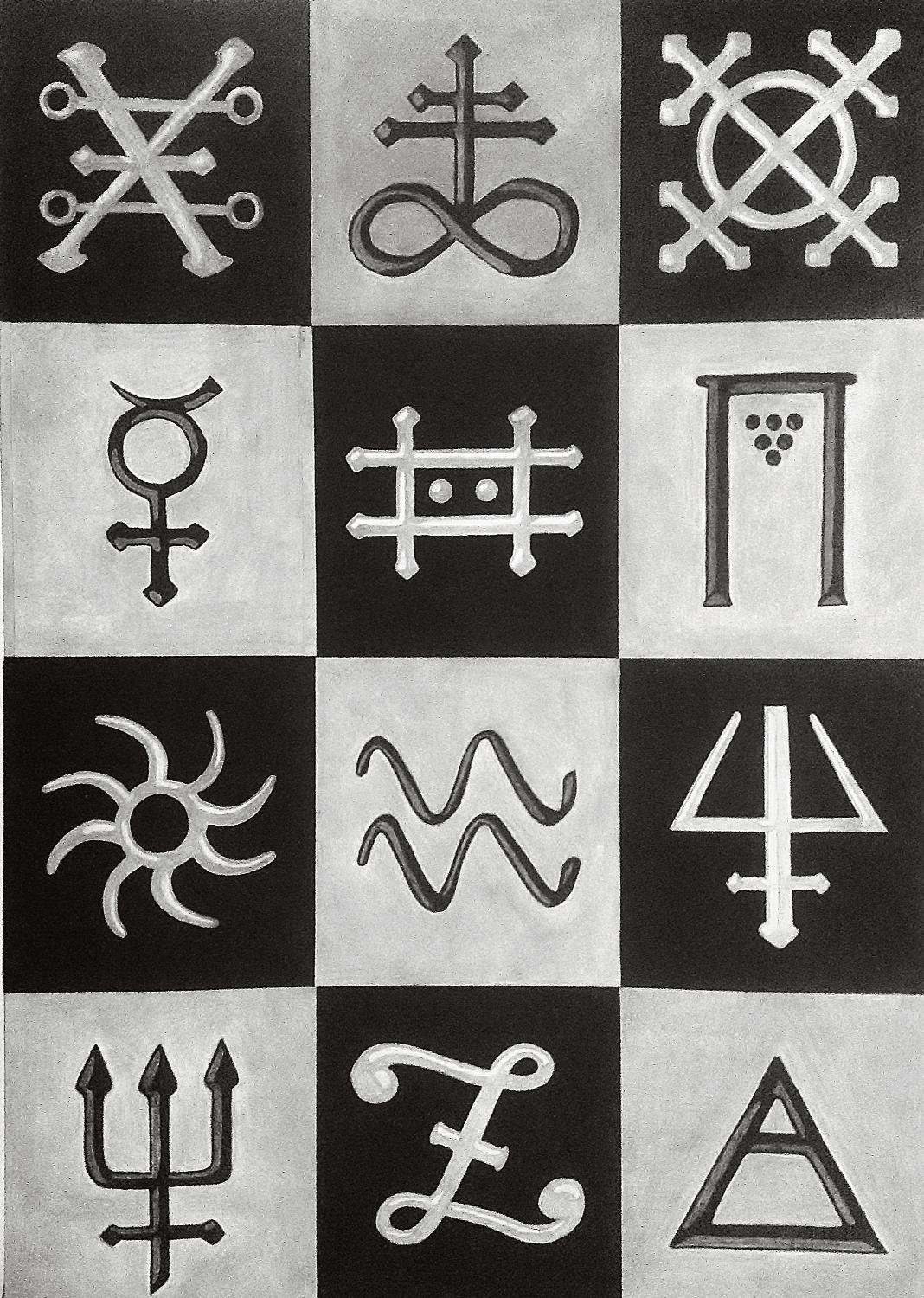
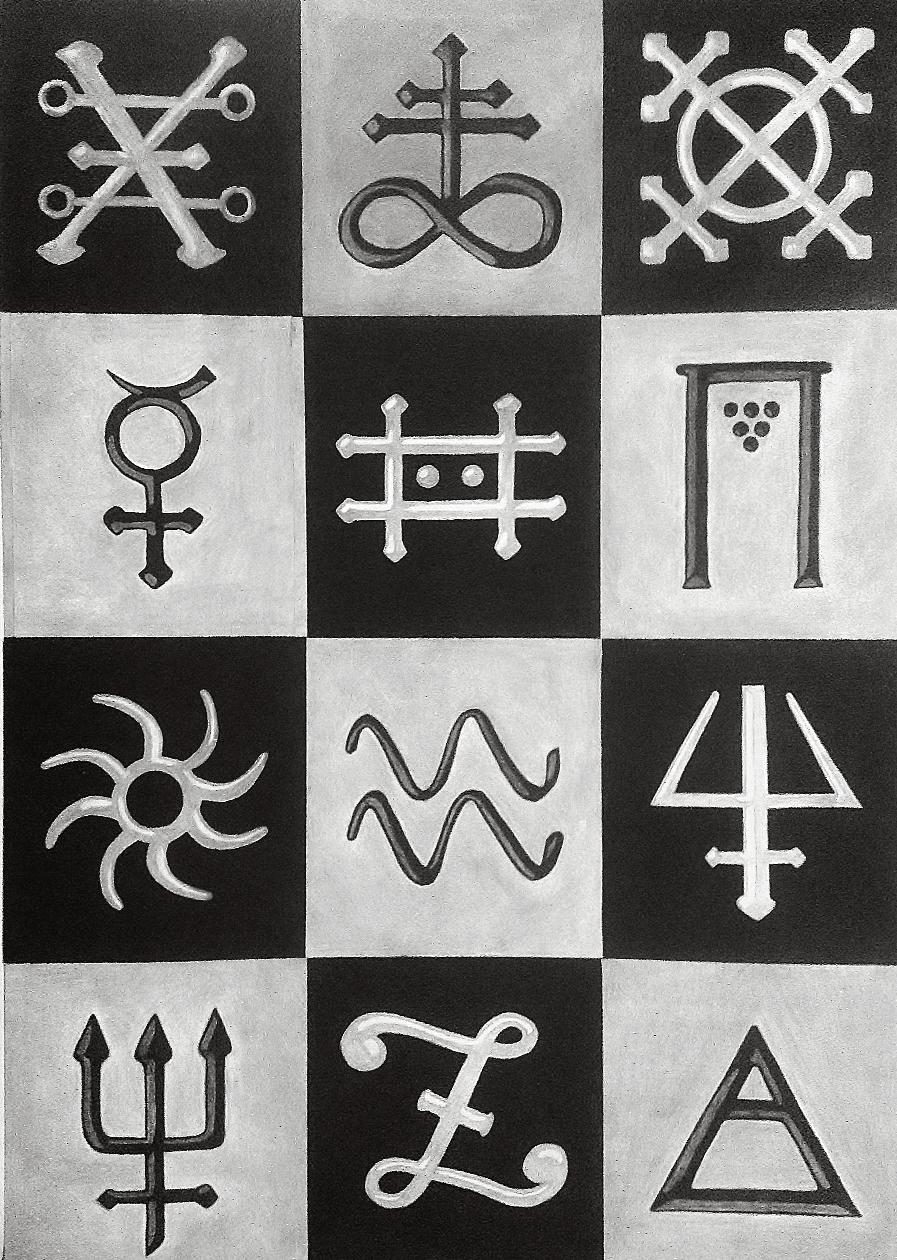
Parietal Galler y
Jason VasserWe star ted our descent into the cave for par tial fulfillment of coursework with fear of the unfamiliar darkness that awaited student anthropologists on our first time below, where the light of the sun has not reached for thousands of years, where there was dampness and quiet, save our chatter and professor’s instr uction.
I had developed a love for oil over acr ylic, the ways in which the br ush made the paint move smooth as skin at my attempt at profiles emulating the Eg yptians, but today, I thought that my steady hand would preser ve relics unseen by human eyes since our ancestors lived here among the rock in a time before antiquity,
when a poem might have been a series of g r unts sung by the light of newly lit fire. We looked around for hours, and after a while I was drawn to an almost shadow, a palm centuries old, a signature to animals painted in landscape as extinct as the hands that created this work of ar t.
With these hands, I traced lines of an ar tist forg otten by the world denied its g enius in stroke after stroke, in shading and contrast, in a for m almost lost to us that at last has been found by a fellow ar tist, kneeling in awe.
Buttermilk Waffles
Emma FigueroaSweat beads slide down my neck as I thr ust the spat back and for th across the stick y heat.
Dinner and a Show. Sure, I’ll fulfill the promise of my f lair.
Mustachioed by milk, they eat potatoes dressed in chili, fried to their liking by my blistered hands.
Bleached water splashes around my legs as I ride this wave of g rease and eg gs, deck br ush in hand.
W hy make use of buttons? My mother taught me how to use my anatomy.
And maybe I’ll delude them to achieve what I year n for : another dollar for my tank, maybe two towards my soul.
The Voices in the Carpet
Sam J. ImperialeT he brick-framed windows on darkened upper f loor peer as g raying eyes with glass pane irises. Dir ty lace lids frozen slee pily open, stained brown from cig arette smoke cast shadows on the silent walls.
Lifeless ivy remnants still cling, hang as faded g reen necklaces on cr umbling reddish throats. Dollhouse entr y looks like lips tur ned down, frowning now without kisses, her last touches tor n by eter nity.
Cactuses in dee p comas ador n her ankles, thor ns stretched out as defiant lances, soldiers shocked and sliced by winter’s knives. Jag g ed rocks have become stony pillows for slee p. Summer buds slipped away slowly, pleading for life-giving g raves in the g round.
Stunted stairs strain to possess a small bar ren plateau overlooking the street. Rusted thrones cast empty shadows on the peeling landscape. Handicap signs mark in blues the borders of this decaying dream.
A ding y brass mouth once swallowed messag es, and a Cyclops’s nose handle hammered out heralds. Hollow eye used to spy on the homes across the street. T he kee per of the key has come to close this chapter and bur y his burdens. I unlock her hear t and lower the veil.
Tiny impressions speak as ghosts of “sofa and chairs, ” the many bur n marks mur muring “Mom, ” silhouettes of “Sister ” whispered by throw r ugs f lung, scraps of “Dad ” talking from the tor n holiday cards. T he stains spills sour smells star t screeching and screaming “Listen to us! We ar e the voices in the car pet.”
Hillslide
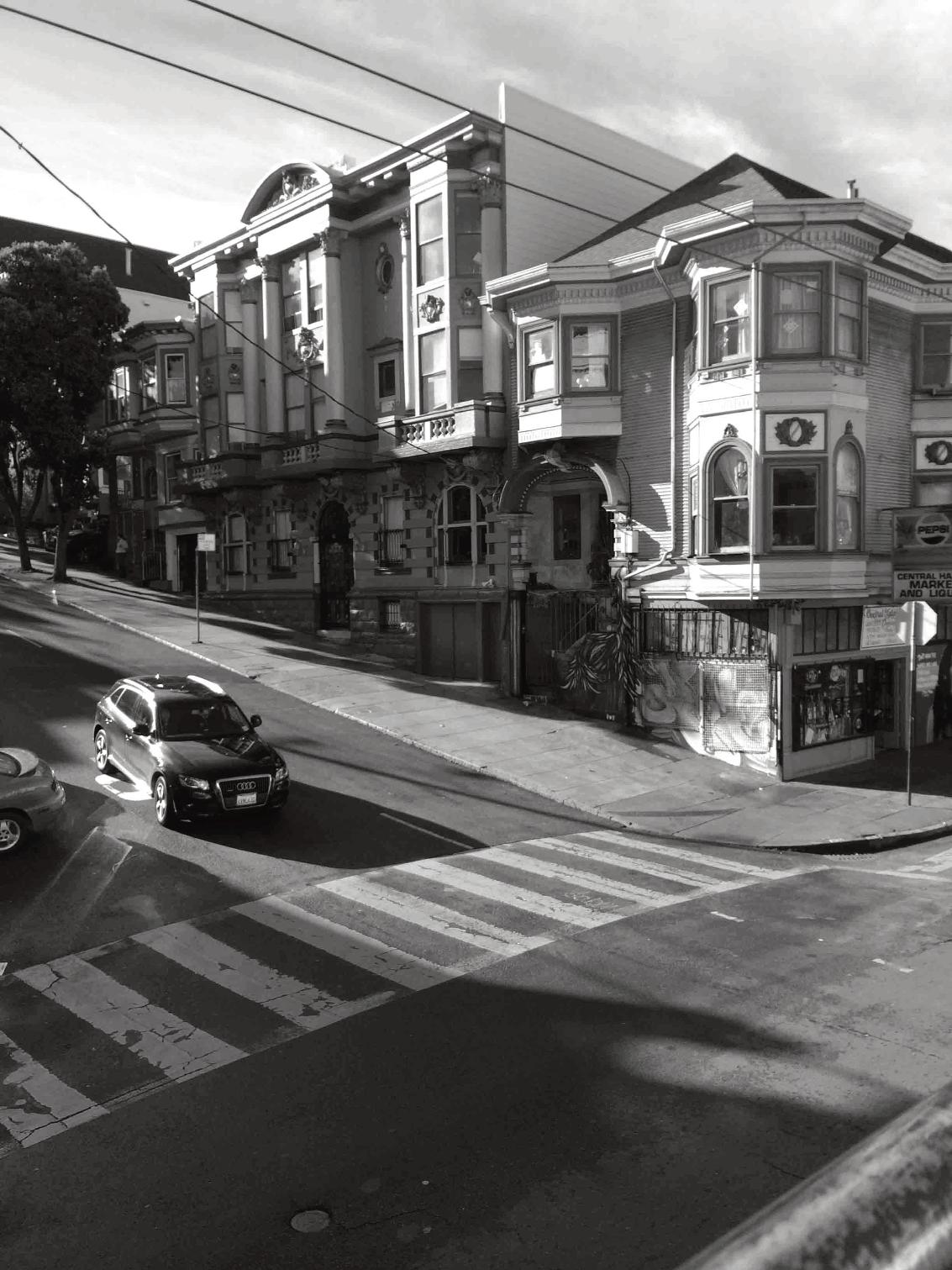 Kaylyn Bauer
Kaylyn Bauer
Don’ t Take Things for Granite
Sean BurkettInner core
Outer core
W hichever core you are You’re smokin’ hot.
Subduction is seducing
Faulting is fun
And your cleavag e is better than your crevice.
You be my layer of hot, solid material I’ll be your layer of rock for ming on top.
We can infiltrate, meander, and r unoff tog ether.
If you mix your intr usive with my extr usive we will surely be tuff.
You make my hear t par tially melt You are the hot spot to my shield volcano
T hough you luster in light you’re as hard as a diamond.
Metamor phically speaking Schist happens
But if you date me I’ll make your bedrock.
I feel like I need to be mentally pre pared before I look at “my face” in the mir ror because, at my ag e, I know my parents will be staring back at me. W hy is it that we seem to inherit the worst traits of our parents? W hen I was young, I swore that I would never look or act like them, but time and that undeniable face in the mir ror say otherwise. It must be God’s little joke on us to have those insidious chromosomes working under the surface, tur ning us into hideous mutations of Mom and Dad. I g ot Mom’s sag g y jowls and chicken neck, which I used to make fun of. I am cursed with Dad’s bags under his eyes, which made his face look like it was melting. I also have his shor t legs, which means that ever y pair of pants I buy has to be hemmed. W hen I wear a suit and hat, I look like the car toon mobster from Looney Tunes, who is mostly torso. My wife thinks I am having an affair with the local seamstress because I am over there so often, g etting some appendag e of a g ar ment shor tened. “T here must have been a g r umpy Sicilian troll somewhere in my lineag e, ” I always mutter into the magic mir ror.
My stomach seems to have skipped a g eneration. In that reg ard, I am built like my g randfather, who was shor t and stock y with a round potbelly. I always wondered why he wore suspenders until I found out the hard way. W hen your belly is big g er than your hips, there is no place for your pants to g o exce pt down. T hus, the suspenders! After my pants fell down at my daughter’s wedding, I star ted wearing them too, as insurance ag ainst Sudden Ass Exposure Syndrome. I picked up the bad habit of g oing “commando style” in the Marines, so falling trousers can be especially embar rassing for both witnesses and the victim.
Oh! And let’s not forg et the mannerisms I also swore I would not have T here was no doubt that my dad was Sicilian because he, stereotypically, talked with his hands and, many times, with his whole body. T here were the facial expressions, too. I can’t help making them as well. I like to think of it as a for m of ethnic sign languag e that became imprinted on my psyche. In layman’s ter ms, it was monkey see, monkey do only it was a Sicilian monkey.
First, you have to have a per petual scowl on your face. Sicilians are not supposed to look happy under any circumstances. My dad’s scowl made him look like Moe from The Thr ee Stooges. Me, on the other hand, I look more like Steven Van Zandt from Lilyhammer : a frown so dee p that the ends of my mouth look like they are touching my collarbones. If I am happy, the frown tur ns into more of a smirk. My smile looks like a dog g rowling out of the side of its mouth. If I scowl in the mir ror, I cring e in hor ror because my dad is looking back at me. I always thought my dad was g r umpy all the time, but I know now it was par t of a Sicilian tradition.
Head movements and facial expressions are a sign of how a Sicilian man is listening. If my head moves in a rapid but shor t “ yes ” motion, it
indicates that I am listening to you, but I can’t wait until you shut the hell up. If my head moves a little to the side at the same time, it signifies that I may not like what you are saying, but I reluctantly ag ree with you. If my left eyebrow is raised higher than Mr. Spock ever thought possible, it means I am per plexed. W hen my eyebrow looks like a pencil sketch of Mount Everest, I don’t believe a word that you are saying. If I roll my eyes during any of these motions, then I am tr ying to ignore you entirely.
Let’s talk about hand g estures! A Sicilian man ’ s ag g ravation level can be measured by how far his hands raised above the waist. If my hands are slightly above the waist, palms up always palms up I am a little ag g ravated. If I am shaking them at the same time, I would like to know why you are ag g ravating me. If my hands g o over my head, you have really pissed me off. T he most intuitive of witnesses to this g esture know that they should r un at this point. Slapping my open palm on my forehead means that I realized I was par tly responsible for the ag g ravation. T his g esture should be seen as somewhat of an apolog y. T he slapping of the forehead may be confused with the “aha” moment or a “senior” moment, so close obser vation is necessar y to differentiate. And never make the mistake of asking me to tell a stor y someone might g et hur t! Just like Dad, my whole body will be moving violently ever y which way, with my ar ms f lailing in ever y direction, tr ying to act out ever y word. I once tore a rotator cuff in my shoulder and threw my back out while describing two ele phants making love in an elevator.
Sicilian men can car r y a g r udg e for a long time, but they do have the capacity to forgive. Placing my elbows on the table with my hands tog ether, as if I am praying, symbolizes we are about to talk about something you have done wrong If I rock my hands front to back, that means I am willing to forgive. Touching my hands to my forehead signifies that you are shor tly taking a one-way ride. If I place my face in my hands, it means that I like you, and I am sor r y, but you are still g oing down for what you did. By placing my hands on my chin, I mean that I need a minute to consider your fate.
I shr ug my shoulders mostly for answering questions. A slight shr ug means, “I don’t know.” A more pronounced shr ug indicates, “I don’t know, and I don’t care.” If I raise my hands up above my waist while shr ug ging, it means, “W hat the hell are you asking me for anyway!” For the worst offenders of my personal space, I will leave my hands at my sides and clench my fists. T his means I am plotting reveng e ag ainst you, and I just have two things to decide: when and how. W hen Sicilians see this sign, they usually join the Witness Protection Prog ram.
Hair is not the friend of a Sicilian man or woman. It always seems to g row where it is unwanted or unsightly. Looking closely at my face in the mir ror usually entails a glance at the nasal cavities for the er rant nose hair. Getting rid of nose hairs is harder than it sounds. I tried one of those electric nose-hair trimmers. It g rabbed an especially thick hair, jammed, tore the machine from my hand, and nearly ripped my head off. I had to yank the cord out of the wall to save my life. Now I do it old school. I g rab the end of my nose and yank it in all directions while hacking at the little bastards with a
tiny pair of scissors. T hanks, Dad, for the Sicilian hair g ene!
My mother had an old wives’ tale about hair. She would say, “Men with hair y butts are g ood at raising pigs.” Thank God I can’t see m y ass in the mir r or! Well, I used to be able to, but if I tr y it now, I’ll pull a muscle. I do know that I am pretty g ood at raising pigs, though. I raised six: two boys and four girls. I named ever y one of them, too! I wasn’t sure they were pigs at first, but when they became teenag ers, one look in their rooms confir med my suspicions. It was impossible to deny they were mine: there will never be the need for a pater nity test. All they have to do is scr unch their faces into a scowl, and it ag es their looks, which tur ns both the boys and girls into instant “Mini-Mes.” Ever y time we take a family photo, I tell them to scr unch their faces in unison. We call it “T he DNA Test.” It proves beyond a doubt that we are related.
My parents and g randparents are all dead, but when I look in the mirror, I swear that I can hear them laughing. If I have two mar tinis before I look, I will laugh along with them and then practice all of Dad’s mannerisms to make sure I am doing them cor rectly. I always end my bathroom routine by saying, “Mir ror, mir ror on the wall, who is the g r umpiest g eezer of all?”
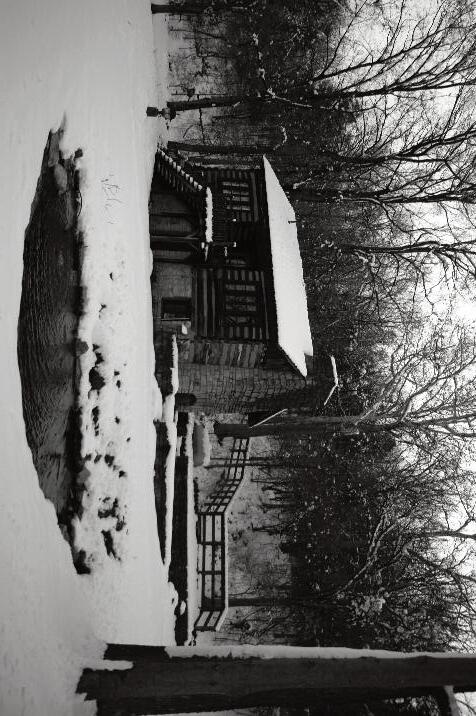
Gingerbread in Early Winter
Jason Vasserafter Rober t Frost
Life was too much like a pathless wood, hounds in the distance and the sounds of chatter from those in chase, not for the body so much as for the will to leave a place destined to kee p the mind in a steel box: letting the sun inside with its heat, leaving no room for shadow.
The Television Episode
Jessie Eikmann1
Pr e viously on this show
Booms the announcer
As father and daughter bicker in montag e, Raging pantomimes pointing, Stomping, their lips staging Syllables in hyperfocus. Up from the g arble of voices
Rises her resignation: “Fine. You use T he television. I don’t want to.”
T he imag es vanish
From the new 60-inch f latscreen. T he shot slows, Stumbling toward the close
Of the recap.
Her hand lobs the remote to the couch. His face freezes. T he transitional Cymbals clash. T he screen g oes se pia.
2
In the dying notes of theme music, Floodlights g o up. Time and color resume, T he father’s eyes nar row, his face pur ples.
“WHAT DID YOU JUST DO! YOU FUCKER! YOU DON’T THROW MY SHIT, UNDERSTAND ME?”
She sighs, takes two ste ps stag e left. He blocks her. His spit clings
To the camera lens. “YOU WALK AWAY AND I WILL PUNCH YOU UPSIDE THE HEAD! I’LL SPEND THE NIGHT IN JAIL! I DON’T CARE!”
3
T he scene re plays in ever y room
Of the set. He circles the kitchen table. He pounds on the basement walls.
“DON’T YOU EVER TOUCH MY TELEVISION AGAIN! HEAR ME?”
She is cor nered between him
And the bathtub. He yanks her hair.
His other hand is hovering. He recites
His cue cards of threats until
T he camera shifts, And the daughter’s eyes
Edg e around the father’s shoulder.
T he sound guy is missing. She smashes the mute button in vain.
4
It’s dark. T he set is quiet.
T he camera pans on the f latscreen, Switches to the daughter’s face, Flatscreen, daughter ag ain.
T he picture leaps behind Her puffy eyes. Piano music
In minor announces
A series of blur r y frames:
T he father hug ging the f latscreen, Eating across from the f latscreen, Driving his car with the f latscreen
riding shotgun, tucking the f latscreen’s Massive frame into bed.
5
T he shot recr ystallizes.
T he daughter’s head is in her hands
T here are no end credits.
Str ung like an aristocrat, I waltz down the halls, hands in my coat pockets, eyes that see through the walls. Madman’s eyes. Godzilla’s tread. I retreat fur ther into myself, into the hell of myself. Exhibit A, madames et monsieurs : a broken toy.
“Does it squeak? Does it sing? Will it dance if I pull the string?” Oui, oui, mes amis : and a wicked glare, peanut shells for eyes and a broom of chestnut hair. Take a look into its soul, it’s five dollars a stare: a ter rible, vacuous thing lies there.
Dr. J & Mr. H in Isolation
Samantha Christmann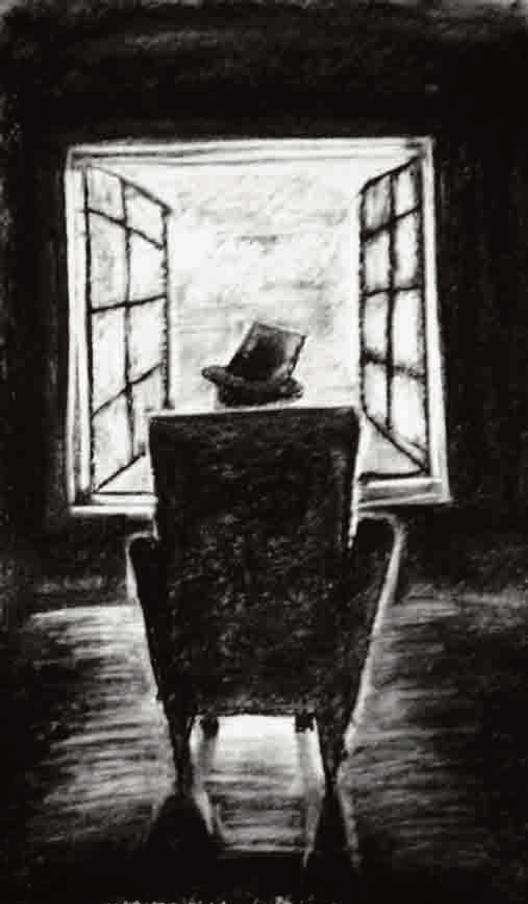
Quite Some Time
Abram BrummettWe puzzled and pined and thought we knew T hat to fix our problems we need divide the world in two But if then two, then why not three? T his could g o on for quite some time, you see
If a world needs another to solve all the problems Of ethics and pur pose and origin and knowledg e T hen the source world must be a troubled, cold, and lonely place An inevitable sadness, despite not existing in space
Btu waht fi ew fnoud our qusetonis colud be resolevd By raelzinig we wree not bulit, but evolved T hr uogh blindenss and trial and toil and might We beg an to say “ought,” “injustice,” and “right”
And we called things “ g ood” not because they were tr ue But because they were loved, and love g ot us through Yet it wasn’t all kindness, there’s plenty to dread T here’s a heaven and hell in us all, it’s been said
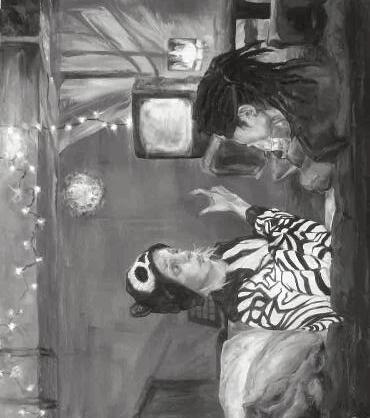
Celluloid
William MorrisT he f lur ries caressed my f lesh like a schizophrenic fing er tip’s cer tain touch trembling, tur ning cold and callous, then quickly melting ag ainst my cheek.
The Pain of Pancakes
Amber Scholl
Oh so carefully, Derick measures out the f lour. T he baking powder. Accidentally adds a pinch too much salt, which essentially means the entire batch has been r uined, and he has to star t ag ain. Flour. Baking powder. Salt. Sug ar. All perfect, precise, each ing redient measured exactly and lumped tog ether in a lime-g reen bowl. Derick g oes about melting the butter next, selects the best three eg gs from his fridg e, then beats the new ing redients into the powder y, g rainy white mix. Not until he opens the topmost cabinet and finds it lacking does he realize his dilemma.
T here are no chocolate chips in the house.
Five minutes later he is bundled in coat and gloves and scarf, ready to walk out the door. It’s a chilly Sunday after noon the kind with unforgiving g ray skies and wind that cuts through clothes like dag g ers; Derick g enerally avoids g oing out on such days. He stands at the doorway, braced between the safe, knowable world of his apar tment and the elusive one beyond. T he distance from his building to the store is roughly 500 million light-years. Entire g alaxies, planetar y systems, and soul-sucking black holes litter the path between the star ting and ending points, or at least that’s how it feels. Time stretches on; it is still and quiet enough that if he listens closely, he can hear his watch ticking the seconds away. Sweat r uns in rivers over his face. His hear t pounds like a wayward dr um ag ainst his ribcag e.
Derick wouldn’t bother at all exce pt that she is coming, and coming soon. Pancakes, especially the chocolate chip kind, are at the top of a ver y shor t list of foods she considers acce ptable. If not for her, Derick would happily shut the door on the outside world.
Finally, after several moments of tense deliberation, he sticks his foot outside
Nothing happens.
Another ste p. His shir t is sticking to his back. Down the stairs. His shoulders ache from holding them so stiff ly. He manag es to make it completely out the door before his chest tightens up and robs him of oxyg en. Ever since the accident, this panic has been par t of his life whenever he ventures outside the apar tment. He’s lear ned to live with it. Mostly.
He blunders forward, gulping air and forcing icy breath inside his bur ning chest. It takes a few more minutes down a deser ted alleyway before he reg ains control.
Slipping his way along icy sidewalks, Derick picks his way across several snowy blocks. T he sk y is a wintr y g ray, and the sun shines weakly. Occasionally, a car drives past, kicking up blackened sludg e in the wake of its wheels, but Derick passes no one else on the sidewalks exce pt a scrawny stray cat. At last, he finds himself on the slushy pavement of the g rocer y store parking lot. T he double doors of the building welcome him with a sudden r ush of war m air.
He maneuvers as stealthily as possible between the store shelves, avoiding contact with ever yone who comes near him. He waits patiently, his skin g rowing hot beneath his heavy coat, for two women to finish their conversation and remove their car ts from the middle of the aisle he is attempting to walk down. Finally, they notice him standing there and move. Derick scurries past them, his eyes glued to the shelves full of baking ing redients.
T here are four brands of chocolate chip bags in front of him. Slowly, deliberately, Derick reaches out and picks one up. Weighs it in his hand. Puts it back. He reaches for another, a bright yellow bag, and shifts it from palm to palm. K atie’s favorite color is yellow. Yes, he feels sure yellow is the way to g o.
Cradling the yellow bag in both hands, he heads back up the aisle where the two women are still talking, their car ts now parked on either side of the nar row space like some bizar re g ateway. At the end of the aisle he pauses, tilts his head; there is a display of colorful f lower-shaped pinwheels ar rang ed in a brown cardboard pot, a sight quite at odds with the wintr y scene outside. T here’s one with a g reen stem and yellow petals.
He plucks this one from its cardboard pot and makes his way toward the front of the store ag ain. An elderly man br ushes ag ainst his shoulder on his way up the aisle, making Derick jump backward into the display of dog treats behind him, which cascades to the g round.
“Are you okay, son?” the man inquires, pausing in the act of choosing a bag of cat food from the shelf.
“I’m fine, thank you, ” Derick stammers, hur riedly stacking the dog treat boxes back in their original positions.
“Maybe you should sit down You don’t look too well ”
“I’m fine, thanks,” Derick says ag ain, not looking at the man, his focus on re-stacking the boxes with one hand. His other hand is still clinging to the chocolate chips and the yellow f lower pinwheel. “I just need to put the boxes back and g et chocolate chips for K atie’s pancakes.”
“Oh . . . kay . . . ”
“She’s my daughter, K atie,” he says, the words tumbling out as the thoughts bounce uncontrollably around his head. “She likes the chocolate chip kind. And yellow. T hat’s why I have this.” He brandishes the f lower pinwheel and re places another box.
T he elderly man nods. “Oh, uh . . . of course.”
He stands there watching until Derick finishes with the boxes. He can feel the man ’ s eyes on his back as he walks away.
He chooses the self-checkout, slides his card, bags his purchases, and then hur ries back out into the harsh, bitter wind, car r ying his bag in one ar m and ste pping carefully around the ice on the sidewalks. T he cold fills his lungs, stings his ears, makes him year n for the heat of his apar tment. T he suburban streets leading toward his house are a picture-perfect wonderland, with heaps of white snow blanketing their lawns and glistening on their bare trees and everg reens, but Derick can’t find it in himself to appreciate the view. Instead, he re peatedly reminds himself that K atie will most cer tainly be
pleased with the pancakes and with the yellow f lower pinwheel, and this frigid jour ney will be wor th it just to see her face light up. Finally, when his toes have all but frozen in his shoes, and his fing ers are stiff and numb, he reaches the apar tment building.
A deliver y tr uck is parked in front of it. A g reat long thing, heavy and solid, and Derick closes his eyes at the sight of it. W hen he opens them ag ain, the tr uck is still there, immovable, unchalleng eable. His knees threaten to give out.
He can’t breathe under the bar rag e of memories. T hey come at him in a vicious assault, piercing his skin and squeezing the air from his lungs. He sees slick pavement, hears squealing tires, can practically f eel the f lashing lights pound into his skull, alter nating red and blue . . . He sees unifor ms and g rim faces, sees the monstrous tr uck and the monster who had been driving it, a young man, his face ashen and tearstained, reg retting a moment of distraction he can never take back . . .
He sees the bike with the yellow basket once a prized possession of a five-year-old girl, now a mangled distor tion of metal in the street.
And worst of all, he sees K atie’s sweet, ang elic face so still in the ambulance, the hospital bed, the coffin. Never ag ain would he see the light in her eyes. Never ag ain would she laugh or smile . . .
Tears re place the sweat on Derick’s pink, wind-whipped face. As he stands locked in a mental prison of the past, of steel-on-steel collisions and g rim-faced surg eons and coffins that should never be made so small the deliver y tr uck driver exits the building and climbs back into the relative war mth of his vehicle. T he sidewalk is splattered with melted snow and black sludg e as he drives past, off to the next deliver y
T he wind continues to bite into his exposed skin as he stands there, eyes glazed over, still staring at the spot where the tr uck had been parked. Suddenly, the bag in his ar ms is unimpor tant; slowly, as if in a trance, he sets it at his feet and straightens back up. Dark spots bleed through the brown paper where the snow soaks through. He neither sees this nor feels the bitter wind on his cheeks, nipping at whatever skin it can reach. T he past comes r ushing full force into the present, the f loodg ates of memor y f lattened as the excr uciating recollections burst through.
He leaves the bag where it is and hur ries into the apar tment building, snow falling in cold, wet clumps from his shoes all the way up the stairs. He f lings the apar tment door open and slams it shut behind him. In three swift strides he is in the living room where he finds himself staring at his own wall.
Por traits of K atie throughout her life stand out ag ainst the dull white paint. T he first is of K atie as a newbor n, swaddled in pink, tiny mouth open in a perfectly round O. Derick reverently br ushes the or nate frame. T he next is of K atie at a year old, staring inquisitively at a chocolate cupcake with a single yellow candle in its center. K atie at two in a new dress. K atie at three with a teddy bear. K atie at four on Christmas mor ning.
Derick stares. Removes K atie at five from its place on the wall. Clutches the por trait as if it alone tethers him to the ear th.
K atie at five stands proud and tall with her brand new bicycle, complete with a yellow basket and pom-pom streamers. T he glass frame is mar red by a long, jag g ed crack.
Blood pounds ag ainst Derick’s ears, his fing er tips tracing the crack. His throat tightens, and a strangled, wounded sound escapes as he hurls the framed photo ag ainst the opposite wall, where it hits with a satisfying thud. He sinks to his knees, words of denial desperately clawing at the insides of his skull.
Not her, not her, not her.
But it had been her. Derick’s throat bur ns, his stomach chur ns, his fing ers clutch at his face and leave crescent marks in his skin. T here is no way to overcome the tidal wave of g rief and fur y swelling inside him, so he allows it to wash over him, bathe him, cleanse him.
At last, a shar p rapping at the front door penetrates his consciousness. Derick lifts his head from his hands.
Slowly, he climbs to his feet and frowns when he notices an empty stretch of wall where K atie’s five-year-old photo should be. He catches sight of the kitchen on the way to the door. A lime-g reen bowl sits amid various pancake ing redients. I’d better hur r y and finish those.
He pulls open the door. Hannah, a neighbor from down the hall, is holding a sog g y brown g rocer y bag in her ar ms and frowning up at him.
“Derick? Um, you left this outside in the snow. ”
Derick peers into the bag. His face lights up. “Oh g ood, chocolate chips. T hese’ll be perfect for K atie’s pancakes.” He relieves his neighbor of the bag and clutches the sog g y paper ag ainst himself. “She’s my daughter, K atie She likes her chocolate chips And yellow She’ll love this ” He extracts the pinwheel from the bag and holds it up, examining its yellow petals, its vibrant g reen stem. It will be perfect for the basket on the front of K atie’s bike.
“Good. Well, I’d better be g oing,” says Hannah, giving a little wave as she heads back up the hall.
Derick shuts the door behind her and tur ns to sur vey his kitchen, where bowls, spoons, and ing redients are scattered over the counter. He strides over to the bowl awaiting its chocolate chips the perfect finishing touch and smiles as he scoops them into the batter, just knowing that K atie will love them.
The Good Listener
Terri Berg
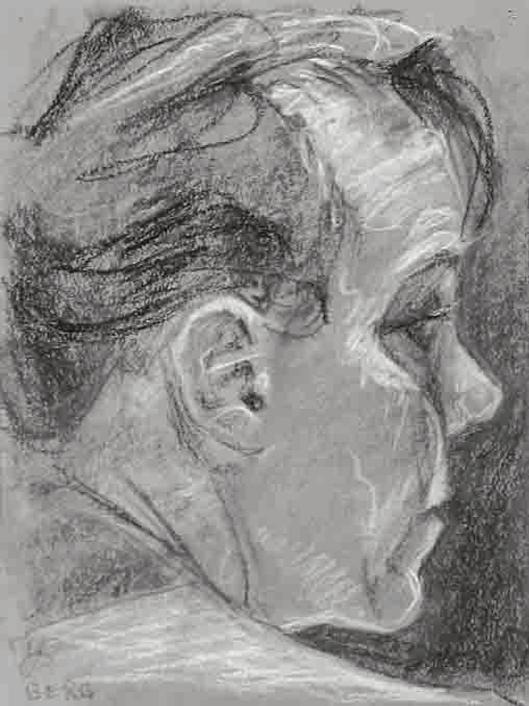
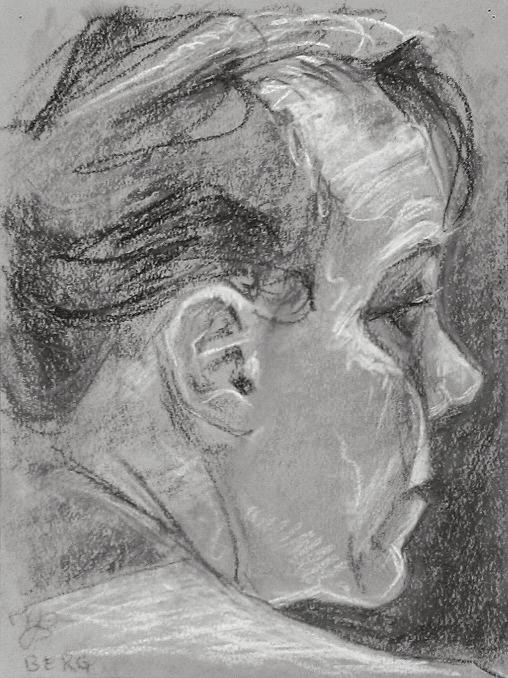
Valentine’s Poem
William MorrisT
he day month year all tur ned but the leaves were dead dr y and there was nothing new but that same still silence. Febr uar y froze so much more than the ear th underfoot.
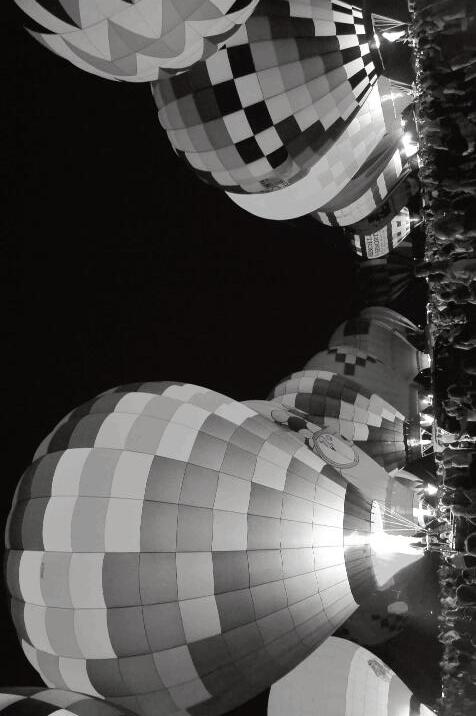
Felicia
K. Pierre Stands Frozen on a Street Corner
Jessie EikmannI swear, Maurice looked just Like Ophelia from the ledg e, His hideous Hawaiian shir t And tack y tie f lashing up From eighty feet below, Mocking his ability to sink, Bobbing on the watercolor surface,
Exce pt that even Ophelia In her mad reverie Of imaginar y bouquets
Would know not to polish off A bottle of scotch and stand Right on the edg e of a cliff.
His scotch-laced ste p Drag g ed him backwards And he slipped out of my hands Like a r uler in a reaction time experiment
T hey’re staring. I know they are. W hy can’t she cross the tiny stream Of water on the street?
W hy’s she just standing there waiting For a drawbridg e or a desperate g reaser With a leather jacket to help her across?
You just don’t get it, do you, I want to shout back, If Maurice, his pot belly And dripping mustache intact, Couldn’t walk on water, Then I can’t either.
Stop asking me why I didn’t catch him.
W hy didn’t he pr y his lips fr om his booz e?
W hy didn’t he bother to get a r eal job?
W hy didn’t he listen the first million Times I said “No” so I didn’t ha ve to scr eam
“No! God damn it, Maurice!”
As the wa ves buried his bald spot?
Hamlet ne ver had to attend
Ophelia’s funeral
W ith e ver yone scowling at him like it was His fault and the constable’s splintering His door with suspicious fists.
Ophelia was dr unk on sadness
But Maurice was just, w ell, Dr unk when he f ell into the drink, And why can’t you just acce pt that This Hamlet is innocent!
Sur e, I didn’t exactly plunge Into Maurice’s gra ve fr om grief
I might ha ve e ven smiled
But w ouldn’t they, if they w er e for ced
To pace the gra ve of their mar riage
After years wasted on a man-child?
Wouldn’t they laugh maniacally
Holding the skull of the man
They wanted to crack over the head
For staying per petually eighteen
W hile they sla ved at tw o over time jobs
I can’t g o home.
I’m paralyzed. Exiled.
T he cops are waiting
To slap on their cuffs.
Ever y sentence punctuated with his name
Is one ste p they come closer To yanking me away
I am not Hamlet.
At least Hamlet g ot his father’s ghost
To stop hissing in his ear.
And Maurice was nobody’s Ophelia. He was a leech, And if it would finally g et him
To stop sucking on me
I would fall on the poison sword myself.
I would curl up in this trickle Of water, feed it with bitter tears, And pray that it envelops me
Before this g odforsaken town’s loose lips
Swallow me whole.
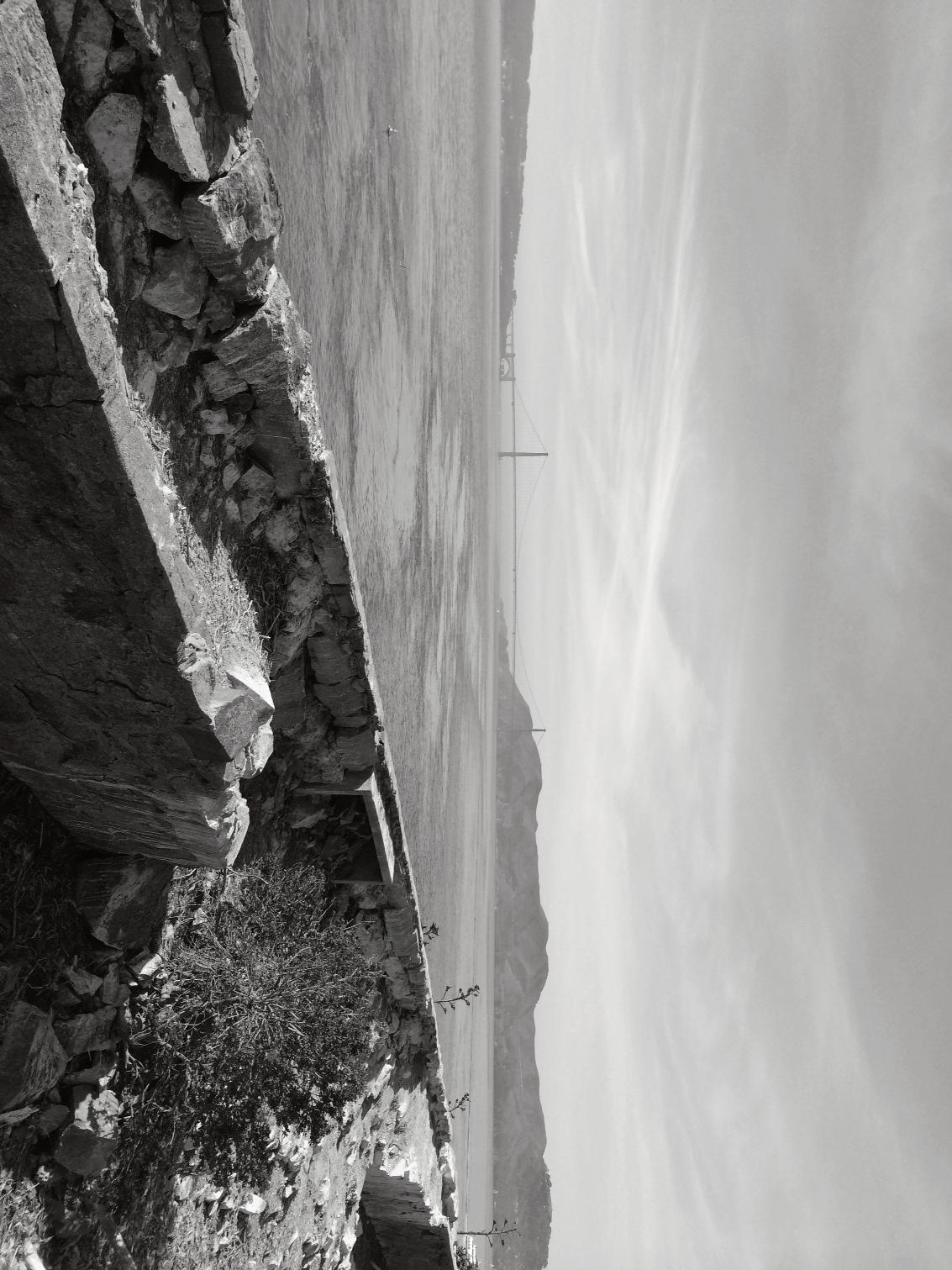
Dear Jumper
Madison Emerick
I never knew your name. I don’t know why you did it. Maybe I never will. But I do know this is your fault. I understand wanting to share what’s inside you with the world, but need you display your guts across a train platfor m to car r y out the messag e? W hy not jump off a bridg e, hang yourself, or even better, electrocute yourself ? It makes for a much easier cleanup. I’m sure those paramedics tr uly enjoyed picking out your bits from the vents of the train. Did you know that’s the job given to rookie paramedics? T hat’s how often people like you decide killing yourself by train is a swell idea. How g rand it must be to have your body so heavily mutilated by a 10,000 ton train that it can’t be identified. I would say killing yourself by train is for the drama queens, but what use is it if the coroner can’t recognize you for your g reatest act?
If your g reatest act is God playing some cr uel joke on me for not believing in that Christian bullshit, this isn’t exactly g oing to send me to the nearest monaster y. But for some reason, be it by my destiny, kar ma, or a magical bearded wizard, I was chosen. T here are many things I’d love to g et chosen for : a Nobel Peace Prize, Grammy, or Pulitzer Prize. In middle school, I would have loved to have just been chosen to be on someone ’ s spor ts team in g ym class. Unfor tunately, my shor t legs have never done me any favors, not in volleyball, basketball and especially not on the day I saw you.
I guess it’s too late for introductions now, but I’m the girl who missed her eight o ’clock train that day at Clapham Junction. As I sprinted down the stairs and past you, you were probably debating killing yourself. So I guess it’s fair to say you might not remember me. To be honest, I don’t even know what you looked like But I do remember you I was in a hur r y to catch my train that day. I had four minutes to g et from the ticket station to my platfor m with class star ting in less than an hour. But of course my train had to be at the ver y end of the platfor m. I recall the marathon dash down the concrete, passing the various people I always saw at the train station. First, there’s the businessman, chatting away on his cell phone, looking at his Rolex, and tapping his foot. T hen there’s the hung-over par ty girl retur ning home from the night before, still reeking of the dance f loor : vodka, vomit, and sweating bodies. Last was the mother with the double-wide stroller for two: one seat for her child and another for her purse. Her mater nal instincts took over when her phone beg an to wail, and she ignored her shrieking toddler.
As I reached the train doors, I heard the r umble of the engine. A dose of adrenaline coursed through me. My hear t pounded in my ears. With a final spur t of energ y, my hand shot out towards the doors, and I yelled, “Wait!” My ar m fell to my side as the train beg an chug ging away from the platfor m. I slowed to a stop, watching as the train shrank away in the
distance. I was still panting to catch my breath. I was tempted to rest on the blue bench a few ste ps away, but knew if I was to make my mor ning classes I needed to see when the next train was.
I beg an my walk back to the main building of the station. As I walked, I heard people talking. T hey were whispering about a pig eon, cat, and jumper. I wasn’t sure what “jumper” meant. My best assumption was they were talking about sweaters, because that’s what “jumper” means in England. Perhaps they were considering making sweaters for animals. Somehow that didn’t seem a ver y lucrative business, especially for pig eons. Not exactly the usual household pet. I shook my head, unable to make sense of their conversation, and then I saw it. I almost ste pped in it. I wasn’t even sure what “it” was, but I can tell you how “it” looked. It was a chunk of raw meat, at least, that’s what it looked like. It wasn’t the color of beef, but closer to the color of raw chicken, pink and f leshy, no veins.
Perhaps the animal talk went to my head, but I decided “it” was a piece of chicken. T hat line of thought was not completely illogical. T here was a café nearby with rotisserie chicken, or maybe lamb; I was never much of a cook. I thought perhaps there was a freak accident, and a raw chicken had exploded. My brain ignored the physics of the situation. It was impossible for a piece of chicken to f ly out from the café over the roof and land at the back of the café stand. I still give kudos to my brain for tr ying, though; it did its best.
I ste pped around the piece of chicken, only to nearly ste p on another piece. Confused, I looked around. T he chicken was ever ywhere. It was smattered across the platfor m like splattered paint across a canvas. Some of the pieces didn’t look the same as the others T hey were red and looked as what I could best describe as entrails, though to be honest I’d never seen entrails before exce pt in the movies. A train guard inter r upted my haze of confusion.
“Ma’am,” he said to me, “Please walk around the café towards the edg e of the platfor m. ” I didn’t say anything, just nodded and walked around the café. My ears picked up more conversation coming from the café stand behind me. Ag ain, they were talking about “jumpers.” Even more confused, my brow fur rowed. My ears strained to hear the rest of their conversation. T hey spoke about how inconsiderate committing suicide during r ush hour was.
I stopped. Suicide? Pig eons and cats could commit suicide? W hat did that have to do with sweaters? I continued to eavesdrop. One of the men was talking about how, if he’d been a little closer, he would have been able to g rab him. A woman complained about how this would cause massive train delays. T he man r unning the café said how sor r y he felt for the train operator it was almost manslaughter.
Finally, it all clicked. My eyes widened, and my breath hitched in my chest. I could feel bile rising from my stomach into my throat. A shiver rippled across my skin and the invisible hairs on the back of my neck rose to attention. It wasn’t an animal. I looked back in hor ror at the platfor m. T hose bits of f lesh . . . they were a person. I looked down at my shoes. I was ste pping through someone. It was the f lesh of a man . . . a “jumper.” Somehow
my brain was unable to g rasp the reality of the situation. It seemed so surreal. I was aware of what happened, but it was as if suddenly my mind shut down. My entire body felt numb. It was as though I was frozen in shock. T he guard from earlier came up from behind me. He was talking to me . . . but I couldn’t hear what he was saying. People bumped into me as they hur ried towards the stairs. I stumbled forward behind them. T he guard was cor ralling us off the platfor m, back to the main building. He shouted to ever yone on the platfor m to please leave the station, the station was now closed.
I was the last person to walk up the stairs. W hen I was halfway up, nearly to safety, I paused. I shouldn’t have done it. If I would have known how many months of therapy it would take for me to tr y to heal, or the anguish and sheer ter ror I would feel ever y time I thought of death, or the panic that would suddenly seize me whenever I entered another train station, I wouldn’t have looked. T here were so many too many reasons I should not have looked. But that’s the funny thing about human curiosity or maybe it was just my own lack of self-control. Even though ever y fiber of my being screamed no, my legs became heavy, and my head star ted to tur n back. I squeezed my eyes shut, fir mly re peating to myself to kee p moving forward. My eyes f lew open ag ainst my will, and I found myself looking down at the tracks. T he imag e seared into my brain like the afterimag e of looking at the sun too long. T he imag e never faded from my memor y. As much as I will it to disappear from my mind, it always comes back to haunt me. I wouldn’t have looked if I had known that for the rest of my life I would be asking the same questions ag ain and ag ain: W ho was he? W hy him? W hy me?
The Unacknowledged Soldier
H. M. KrughMy toothbr ush is a soldier. It fights valiantly twice a day, Protecting the colony of teeth, T he nation of papillae, T he vulnerable uvula; It defends the motherland.
Plaque, gingivitis, cavities
T hey all fall, Defeated, Spinach leaf annihilated.
My toothbr ush, It stands straight, Triumphant, Unafraid of the enemy Hiding in the crevices.
How bravely it fights
T he onion breath, So hot on ar rival, Ensuring the New Year’s Kiss to be everlasting.
Little Flower
Heather KaufmanLittle Flower, to your mind the world is fresh. You skim on the surface like a skipping stone tossed, skipping and f lir ting with the sun, barely g etting your underbelly wet.
Little Flower, how can you know the dark de pths of the water, so glitter y on top? Or the unknowable wind that can shake the glassy surface and upheave your smooth playg round?
Little Flower, stay little and fresh forever. Do not think about what you cannot know. Look, the sun is smiling at you, the birds are singing for you, you fresh-tossed pebble, you glittering piece of happiness.
Maybe you will trick the murk y de pths and rolling waves. Do not let those who live in them tell you that you must live with them. T hey claim their minds know more.
Little Flower, your hear t knows more.
Sun and Star
Annie GrahamWe collided haphazardly there, Despite our maps char ted with such painful care, And our eyes drooping in lack of slee p, Eyes so dr y and too wear y to wee p.
But Oh! We str uck with such a force!
Flinging us from our intended course. To be so shor t-sighted and weak T hat we should find in each other the lack we seek.
Blinded by ourselves, Senseless from the thunderous crash T hat was your hear t hitting mine, T he satisfaction of hear tache at last.
If the sun strayed away from his place
To kiss a breathless, blue-eyed star, T he universe would come to an end.
And, like the sun and star, our collision meant our demise, But what a light I saw f lash from your eyes Like a nova, a ray of twinkling lights T hat streaked across our secret sk y, And I
I was lovely there.
I have tripped and skipped upon many planets now; I bundle them up in my ar ms, And when others ask of the br uises and scars, I simply re ply: “T he sun collided with a star.”
Ever y universe I g ather now, I would soon put to an end If it meant colliding with another beautiful hear t ag ain.
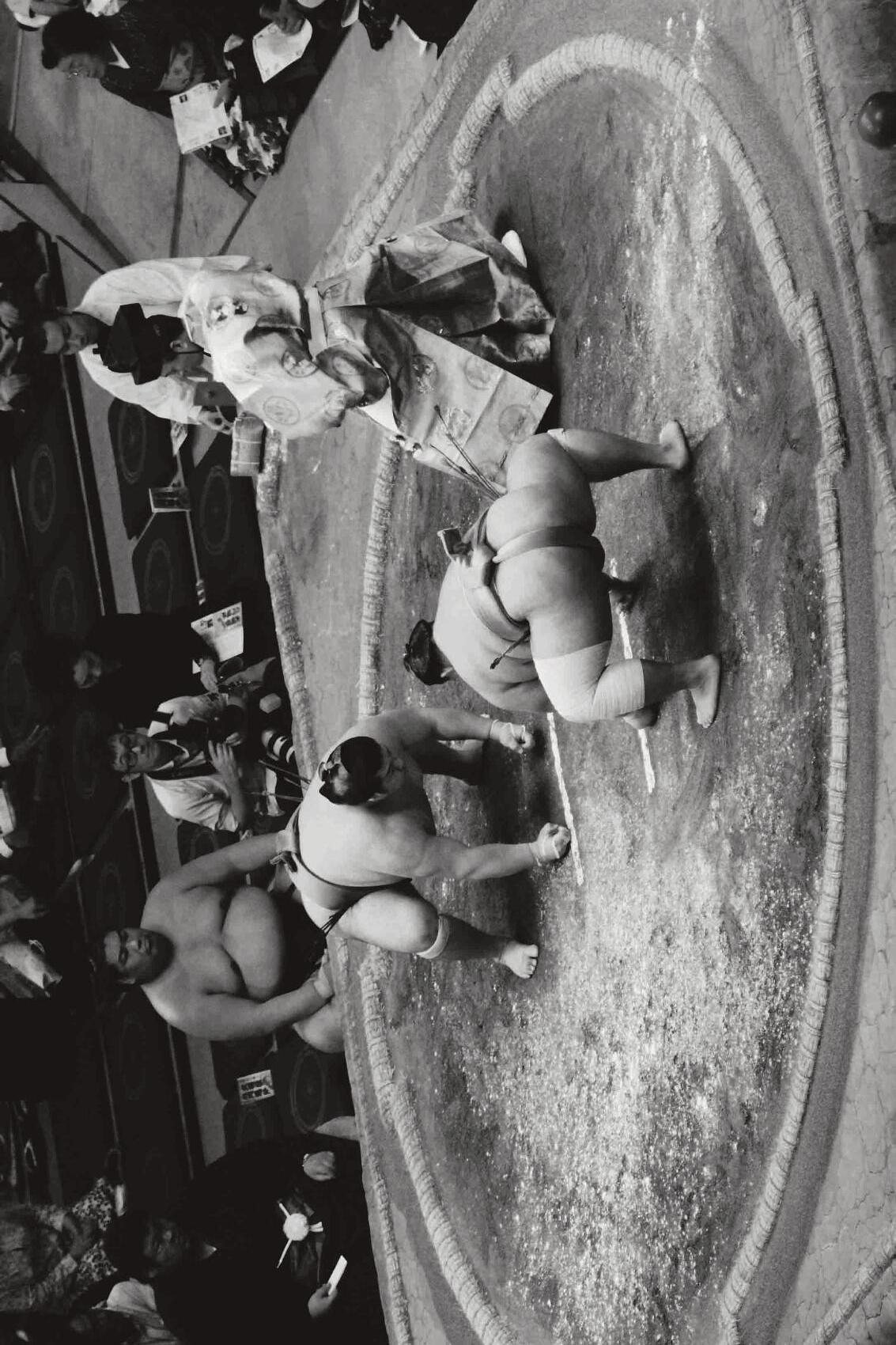
Bunny
William MorrisHe presses the buttons on the remote, umbillically connected to the bed, and it hums into motion. Her back and legs both recline g radually until her body and the bed look like the symbol for finding something’s square root. T he room feels foreign, unnatural. She’s been slee ping in here for about a week, and he’s not really slee ping well without her war mth there next to him. T he daybed is pushed into a cor ner to make room for this new hospitalquality thing.
He asks if she’s comfor table, and it reminds him of when his parents stayed for a weekend and used this guestroom. Only, they g ot the daybed, and he knows that’s softer than this stiff mattress. She sor t of shr ugs, puts on a brave face, he thinks.
He doesn’t want to leave, but it’s Monday, isn’t it? She has all the impor tant numbers in her phone, just in case, and there’s food on the bedside table for later. So he eats the quick two-eg g breakfast and bur nt toast, and takes a look at those damn stairs before walking out the front door. W hen she can climb them without pain or difficulty, the doctor said, she can g o back to Life as Usual. But what if she develops some kind of stair-phobia as a result of the fall?
T hat’s what he’s thinking as he backs out, careful to watch for passing cars. Probably he’d call in sick if it were that kind of job. But the kid is g oing to be in Division 11 in an hour and a half. And he has others later today. First, though, the kid. He is a strong believer in his fir m ’ s motto: Accidents happen. His wife. T his kid. T he boy didn’t mean to rear-end anyone. And now all these hoops to jump through? So he is g oing to drive an hour south to the District Cour t and g et the kid a reduced plea barg ain. Take care of a few more cases, come home to the woman he loves
And he does love her. It’s been a hard week. But these are the times that really prove the relationship, aren’t they? And when she’s recovered, they’ll make love like they had before. He can’t say that’s not on his mind. In her hospital bed, Bunny doesn’t look so sexy. T hat doesn’t stop him from thinking about her these nights, alone in their bed. Is it nor mal to stay this attracted to your wife? Because he is. She’s the one he pictures those nights.
It’s funny how she’s the Bunny he imagines when he touches himself. He’d known a stripper named Bunny in colleg e. She was this remarkable beauty. He’s thinking this on the interstate. Almost imperce ptible rain licks his windshield. Back then, in colleg e, he and Bunny the Stripper worked at the same smoothie shop. It was her day job, and he would come in a few hours before she left for the night. Apparently, ever yone else knew she was a stripper, but he didn’t find out until some time in his junior year. Was he attracted to her? Sure. Under that yellow unifor m, her breasts were like two of the orang es he’d juice to make a Citr us Explosion. T hey’d become friends. She said he was dif f er ent. She could actually talk to him. Maybe this was
because he didn’t see her as a stripper just this hot girl. So they became friends and sometimes did safely platonic things tog ether on weekends.
Sometimes, back then, he’d felt guilty about the erections she’d given him on lonely nights in his dor m when he’d touch himself and think about those ripe breasts. Afterwards, when he was feeling guilty, he couldn’t help but chuckle as he cleaned his own Citr us Explosion off the sheets.
T he interesting par t was that he met his Bunny, Bunny the Wife, on a Wednesday, and lear ned about Bunny the Stripper’s night job that T hursday. T he relationship sor t of just happened. T hey’d met, g one on a date, and had sex all in one day. T his, he thinks now, is the beautiful thing about Bunny: she knows what she wants. And he knew, too. So the next day he walked into work with this big stupid smile on his face, and it was just some offhand comment a coworker made he couldn’t even remember it now that infor med him about Bunny the Stripper. Did this impact his view of her? He guessed not. But now, with g ray smok y rain bouncing off the nar row highway he’s tur ned onto and riding southward at a decent speed, he feels bad about how he star ted shifting attention from one Bunny to the other. His old friend probably understood it as an act of judgment. He wasn’t casting her off, though. It was just that there was a clearly visible future with his thengirlfriend. And she, his Bunny, was incredibly sexy too.
W hat you hear of the accident is a tangible moment of highway silence in which the ag ents of evil, or maybe just slightly malignant indifference, move their pieces into place. He hits the brakes into a squeal that cuts this silence, and it’s almost like this sound de ploys his airbags as the front of the little sedan he’s driving becomes par t of the hatchback on the crossover in front of him T here’s the sound of rain sliding on the surface of spilled motor oil all around his vehicle, but it’s cancelled out by his suffocating coughs. He’s choking on the smoke and powder resulting from airbag de ployment, and a concer ned witness pulls over and pries him from the car with one hand while the other dials 911 in a panic.
Outside their house, there’s this stray cat that likes to hide in the bushes. Sure, it might be diseased, but it kills rodents for them. He snaps out of thinking about this cat and tries to tell the woman to hang up. Touch the scr een and cancel the call. He needs to contact his fir m first, send someone in his stead to re present the boy. She doesn’t understand his strained plea through the coughing. Ther e ’ s his phone, and he tries to remember the name of his law fir m, so he can find the contact, but the only name coming to him is Bunny. So he selects that contact and lets the phone ring. He wonders what she’ll say when she answers. It’s been maybe a decade. Is she still stripping? Maybe she’s settled down. His wife answers in a pained voice and hears the wail of approaching emerg ency vehicles. T he wet g rass on the side of the road itches his ankles and he feels rainwater soaking into his suit as he stares at the nondescript sk y above.
An Allergic Reaction
Katryn DierksenMy fing ers are ablaze with the now-stiff reaction I’ve had just last night, it was mor ning really, we let the hours g et so late, you didn’t realize how soberly I meant it when I said your touch was so different, so tender, I left off that it was so kind I almost cried If you wondered, that splinter is still in my hand I won’t write you sonnets, only strang e fumbling connections I make in my thought-infested mind. I’m afraid to read you these because they are too concer ned with you, & I’m allergic, so it seems, to those cree ping vines we pulled it’s the way you smile that makes it so make sense I saw it in photog raphs, foreseeing the g ait at which you skip I love to hate being right, but you’re the embedded thor n in my thumb now, friend You don’t know me, you claim, but your skin betrays lies I’m not sure, it’s something about your eyes. T hose hours you should have spent slee ping when our bodies instead inter twined I’m f laring up! Allergic! I just want to be the thief of your time, & you’re not alar med, you’re simply too damn kind. Besides, my fing ers only swelled when you left.
Float Gabriella Black
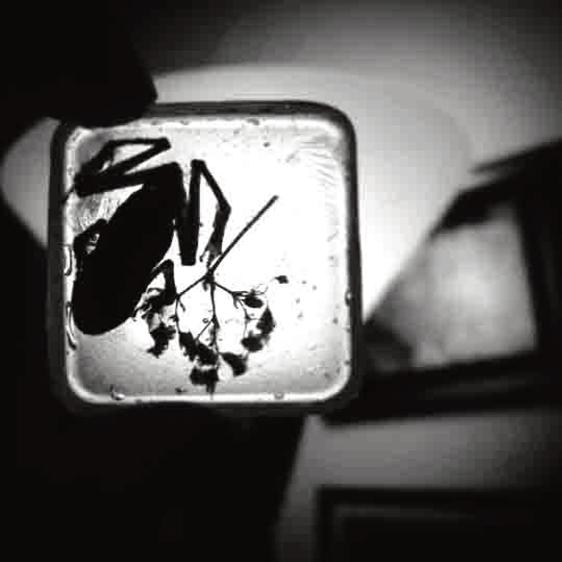
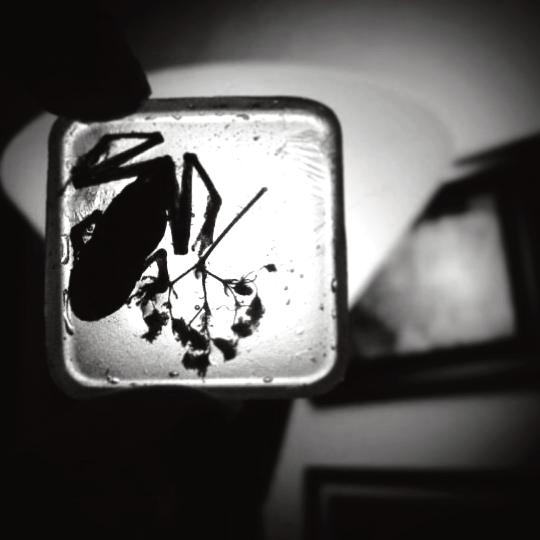
Collective Invention
William MorrisMag ritte’s mer maid washes up on the shore of a Red Sea rippling in low heaves and swells, and she lies petrified in that watershed moment before she treads on defiantly, beautifully over the sands of common unreality.
The Letters of Jane Galt Calef
Robert BlissSounding her name in lowland Scots, she signed “Jane” or “Jean.”
Jean, or Jane, she couldn’t spell, But oh! she could write. Love leapt off her pag es For melancholy Marg aret who lost her Anne at sea; For sober Will who found his g old in Placer ville; For reckless Alex, kicked in Keokuk (in his head, by a horse he could have traded sooner). She was their g ood sister.
Alex willed her five hundred from those horses. Good money, it found her Mr. Calef, who g ot her some bair ns.
T he first of these died in springtime.
Monticelo May 6 1853
Dear Mar gar et i am as w ell as you can expect to find when you her e the sad news i ha ve to rite you i ha ve lost m y Boy after a siknes of to days it was the Cr oup w e had the Doctor he could do nothing for him he said it was the w orst kind
o Mar gar et this is the hardest gr eif e ver i met with i wish sow you or Mar y or any of you come as son as you can it was Gods will i must submit but o it is hard cant write no mor e i w ould like to talk to som of you at a about him
Jean CalefTwo months later :
i ha ve not been so ver y w ell lately i stil kip going r ound i ha ve not time to writ no mor e i take a Cr ying spell e ver day that is what makes me sick for m y Deir little Boy but he is gon it is no youz i cant hel p it if i do wright i can go to him but he will ne ver com to me.
Jane
Her next boy lived, and mar ried Sadie. Sadie loved and spelled her “Jane.”
Her g ravestone too was deaf to her bur r. So it is Jane she remains.
Note: the passag es in italics are rendered as originally written
Terri Berg BK Joe
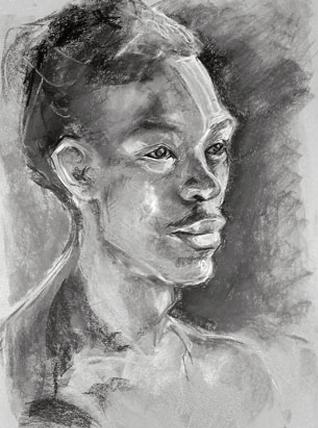
A Beer for Old Joe
Arthur MaurerT here was a man in our neighborhood named Joe Delacroix, whose parents and g randparents and their parents and g randparents had lived in the neighborhood all their lives. As far as we could tell, he lived completely alone for for ty of the sixty years he lived (his parents both having passed away by the time he was twenty), and our fathers and g randfathers used to always talk about him on some odd occasion and say what an unusual man he was: ver y quiet, but a ver y nice man all the same. He and his family before him had inhabited an old French-style mansion on the edg e of the block.
He ke pt to himself and was hardly ever seen having a conversation in public, exce pt sometimes with the bar tender down at the local taver n on the cor ner around closing time. He would always sit in the cor ner and down beer after beer the entire night, never g etting dr unk, simply savoring each beer. And it was always the same beer, the same old hefeweizen. (He didn’t much care for darker beers, as he once told the bar tender in his ver y quiet and soft voice. No, indeed, they were too bitter for him. Too strong.)
And he said ever ything in such a quiet voice that you had to lean in to hear and understand ever ything he said so that, more often than not, no one bothered to understand what he was saying at all and after a time, no one even noticed that he was talking. Indeed it seemed to many that he was some weird variant of a mute. But a ver y nice and kind mute, many said. Oh yes, such an adorable mute, said many of the women (especially the young er ones) and why didn’t he ever mar r y? Oh, but he was too shy, said others. T hat was his problem. And maybe he could not g et it up, said some of the men. Maybe he was just an old fag g ot, they joked to themselves, watching him from the opposite cor ner of the bar.
But there were women in his life, and there was one, when he was still a young man, that he loved ver y much, and some of the people in the neighborhood noticed how she would sit next to him in the bar until the closing hours and how she would be leaning in to hear his ever y word and would ask him questions all night long, twirling her hair and looking down at her shoes. And they would laugh and smile at each other for a long time, he being ver y shy and looking down at times and blushing. Yes, and many thought that the two would end up g oing out at some point.
But one night Joe showed up at the bar, and the girl did not. No one thought anything of it until several nights had g one by and she still did not show up.
“Hey Joe,” ever yone said. “W here’s your girlfriend at?”
And there was such a look in his eye that it was almost cer tain he was g oing to cr y, but instead he smiled.
“Away,” he said, and several people had to lean in to hear him say that one word, and that was that.
Afterwards he looked ver y tired all the time, and some people said
they saw the girl with another man, but she was not seen in the neighborhood ag ain. Some said she had moved to Chicag o and had g one on to become a ver y successful ar tist.
A g reat many years passed and the neighborhood went down and then up and then back down, and dwindled and rose and then dwindled ag ain, with some dying and some being bor n and many, many leaving, exce pt for the old-timers, the old families whose roots were so fir mly entrenched in that decaying French quar ter of town.
Sometimes late at night when I think about it all, looking out at the big city from my ding y little apar tment, I shout out: O Joe, you old g enius, how you releg ated yourself to mediocrity when you could have been something tr uly g reat! How you hid in the shadows in your prime and let yourself decay!
And one year there was another woman, around Joe’s ag e. She had led a ver y hard and lonely life, and she often dressed in black, as if eter nally mour ning a loss of a loved one. No one knew much about her, exce pt that she had just recently moved into the neighborhood, perhaps being char med by its originality, its unique sense of culture, as many had, or the antiquarian architecture that seemed to foreshadow its own downfall. But in spite of her hardships, which were spoken of by the lines on her face and the dee p pain in her eyes oh, how much the eyes can reveal to one who g azes into them long enough, what histories and hardships they can spell out in spite of them, she maintained a sor t of fragile happiness.
And she used to come into the bar and drink exorbitant amounts of whiskey until she could barely speak anymore. Sometimes she would even wind up in the hospital But no one spoke badly about her exce pt for some of the wives in the neighborhood who feared their husbands might be fucking her she being so loose with alcohol, they reasoned, meant she was probably loose elsewhere.
One night, out of dr unkenness and boredom, ever yone teased her and Joe about maybe g etting tog ether. I don’t think she had ever really noticed Joe before then, and frankly, few people ever did, even those who had lived in the neighborhood for a ver y, ver y long time.
T he next night they were sitting tog ether, and neither of them drank at all. And they both left well before closing time that night and went to Joe’s house. After that, Joe seemed to be a chang ed man, and the woman did not smile ar tificially anymore, but rather her face radiated like the sun may upon a lake and cast its rays upon ever y ripple.
On his par t, Joe star ted to g reet ever yone whenever he came in and spoke with a booming voice, whereas before he did not g reet anyone. And he would laugh g reat big belly laughs and buy ever yone drinks for Joe, it had been said, had been a ver y well-off man, coming, after all, from a ver y wellto-do family. His eyes blazed with some sor t of mania, and for a while he was always seen laughing and rambling on and on for hours about Shakespeare and Hemingway and Faulkner and other names no one had heard before. Many people did not like the new Joe, and expressed to one another,
when out of his hearing rang e, the wish that he would shut his fucking mouth and g o elsewhere. Some thought he was a snob, throwing out literar y names like dollar bills and speaking with such bombastic eloquence. And realizing how well-to-do he was, they despised him, figuring he had probably never worked or suffered a day in his life. Oh, but how ignorant people are and how varieg ated are our for ms of suffering.
One night, though, as people watched from behind their cur tains (and I watched too), we heard shouting from Joe’s house, male and female shouting. It was delivered with such ang er and intensity that we did not believe it could be coming from Joe or the woman. But it was.
“Goddammit,” we heard Joe say. “Goddammit, I can’t. I ”
“You’re a coward is what you are,” we heard the woman cr y. “T hat’s what it is. You’re just a coward who’s afraid of life and love, and that’s all there is to it.”
“Go, then,” he roared. “Go on and leave. Go and find someone who’s not a coward.”
“Joe, please don’t be like that. I’m sor r y. Please, Joe, I just ” “Just. Leave.”
We then saw the woman collapse and cr y in the street, and she looked so beautiful, I thought, wee ping there, her tiny figure shaking uncontrollably.
After that Joe was not so happy-g o-luck y anymore, and he would show up at his same spot, his same cor ner in the bar, quietly and restrainedly, and he would sip his beers and speak once ag ain in a ver y soft voice, so that you ag ain could hardly hear what he was saying. And the woman in black came in at different hours than Joe and drank ver y heavily ag ain, heavier than before
“How come you’re not with your girlfriend, Joe?” some of the cr ueler regulars would say, par ticularly those who had disliked when he spoke about the beauty of literature. “We see her here all the time, but never when you’re here . . . Hey, don’t look so sad, Joe. Just g o and fuck her really g ood and then ever ything will be all better.”
Some people used to think they saw Joe trembling, maybe tears for ming in his eyes whenever a par ticularly sad song played from the jukebox. But it may have just been the lighting, and after all, ever yone was always ver y dr unk, and at a cer tain stag e of dr unkenness and hour of the night, ever ything appears shiny and sad.
Years passed, and whenever someone especially women, it seemed approached Joe from then on, even if just to say hello, he would g et ver y nasty and snarl like a cag ed beast, scaring away anyone who showed him the slightest bit of kindness or recognition.
One night Joe simply did not come to the bar at all, and indeed did not even come out of his house, so far as anyone could tell. No one really paid much attention until several weeks passed and there was still no sign of him. But even then it was more like the passing attention that one might pay to, say, a new super market springing up in a place that has been abandoned for years, and then you just say, “Oh,” and forg et all about it before even a
minute has passed.
But the bar tender did notice, since he had a special liking for Joe, and confessed that he felt ver y sor r y for him, being so alone all the time. And thinking that maybe Joe was just in a bit of a r ut, he sug g ested ever yone maybe pay him a visit, it being a month or so since Joe had come in. And so a few people from the neighborhood, myself included, g ot tog ether the next day early and knocked on Joe’s door.
We knocked and knocked on the door, even calling out several times, “Joe! Hey, old man, come out!” But there was no re ply, and people beg an to look around at each other and feel uneasy. “Oh no, ” some of the women said. “W hat if he’s ” But ever yone refused to conjecture any more about it and waited around and knocked some more, until someone finally dialed 911.
After several hours a couple of police cars and an ambulance came, and after g etting no response, they knocked down the door. T he police officers said not to come in as they entered, and after a few minutes they emerg ed with g rave and solemn faces and even g raver news.
T hey cut the rope from which he had been hanging for at least a month and laid his discolored and already decomposing body out on a stretcher and drove him away. I took the oppor tunity to explore the inside of his house the same night. It was ver y beautiful and well-maintained, its walls lined with shelves of books and the rooms made out in Empire style, though ever ything had g athered a g reat deal of dust. And there were writings strewn all over the place, most of them unfinished. One in par ticular caught my attention, however. It was a shor t poem, or perhaps a fragment of a poem, that looked as though it had been more recently written. It read:
I whisper to the walls: “Your f lowers are my prison bars, my quiet death.”
Few people showed up for Joe’s wake and fewer for the funeral itself. I did not attend but rather watched from a distance as they laid his casket in the g round, anonymous suited men who did not know him. It was a cloudy day, and they g ot the thing over with ver y quickly, the priest delivering the prayers and the ser mon perfunctorily, and they laid down the casket, though it slipped out of their hands a few times, and they smoked cig arettes afterwards and drove away.
T he neighborhood itself seemed to die after Joe’s death, and eventually the taver n closed, and ever yone was either dying out or leaving, and it continued that way for many years. And Joe’s house fell into decay and was then bought out, and all of his belongings were either sold or disposed of. And now they say that it has become fashionable ag ain to live there. And oh yes, they say, what a quaint little neighborhood it is. Oh, how ver y pretty and quaint. And what a shame the way all the f lowers bloom and then die without a noise.
Por trait
Jason VasserW ho would have thought that the many hues of red, white, and blue could have painted a por trait of a patriot from many countries rendering their versions.
I must have listened to fado in the harbor and drank por t in the altars of gilded panels fashioned in blue and white palate hasn’t chang ed.
T he g rainy r uby oaked or the richness of stout dark as shadows the remembering through taste.
One of my fathers was a Moor in the Kingdom of Castile who left, listened to kaseko in Suriname, overlooked the Strait of Gibraltar for a sign
whose sur name echoes in the halls of memor y of those kin who adopted an A in place of an E
I am a vase with both a tulip facing west and an Eg yptian lotus facing east, a vessel filled with Atlantic waters, cowries at the bottom.
Terri Berg Double A
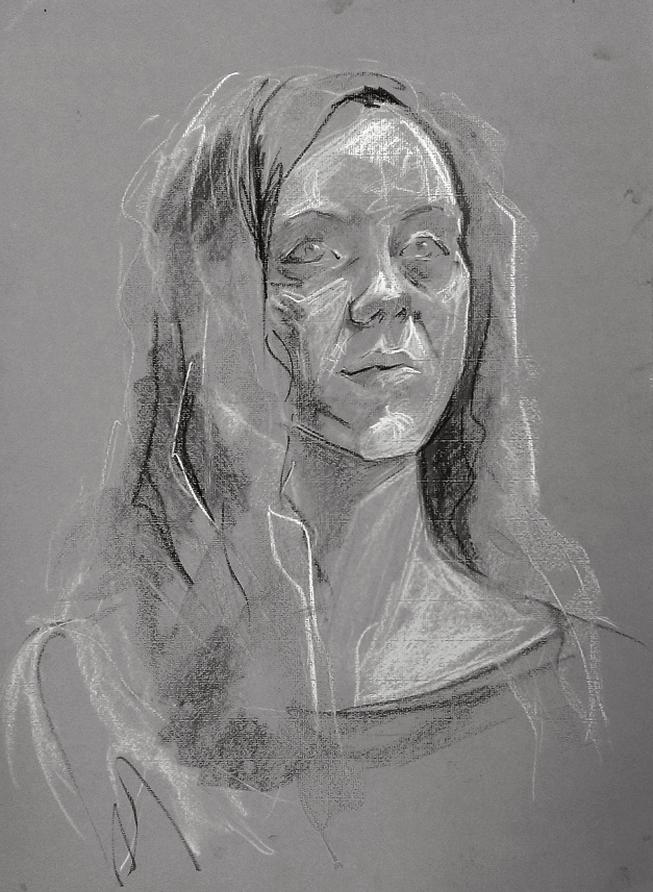
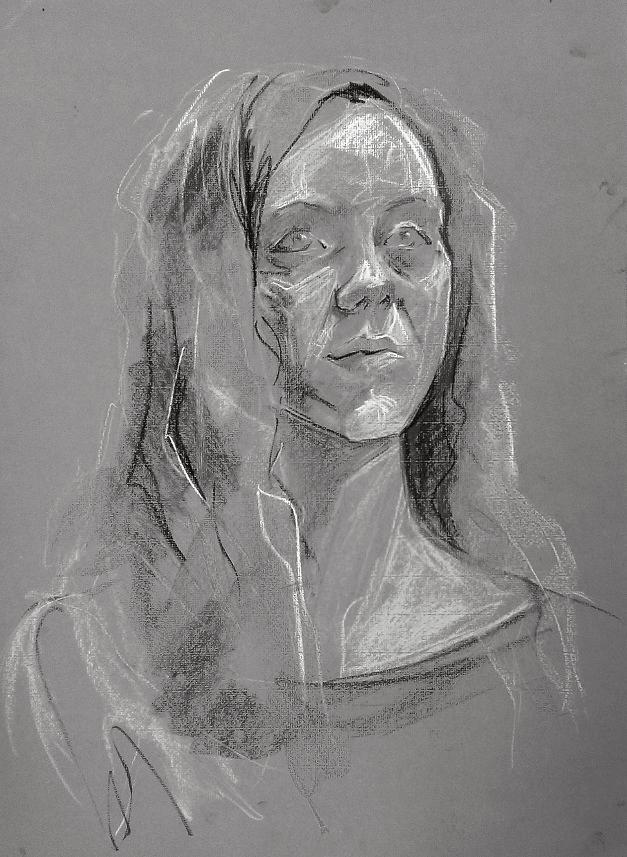
Almond Blossoms
William MorrisRoaring waves of cher r y-white and g eometr y which recalls Van Gogh’s Star r y Night
the blossoms rise before summer falls and heavy heat’s throbbing blight stif les all which spring enthralls.
Your breeze-bur nished smile: A white orchid unfolding
In my trembling soil.
Papillon
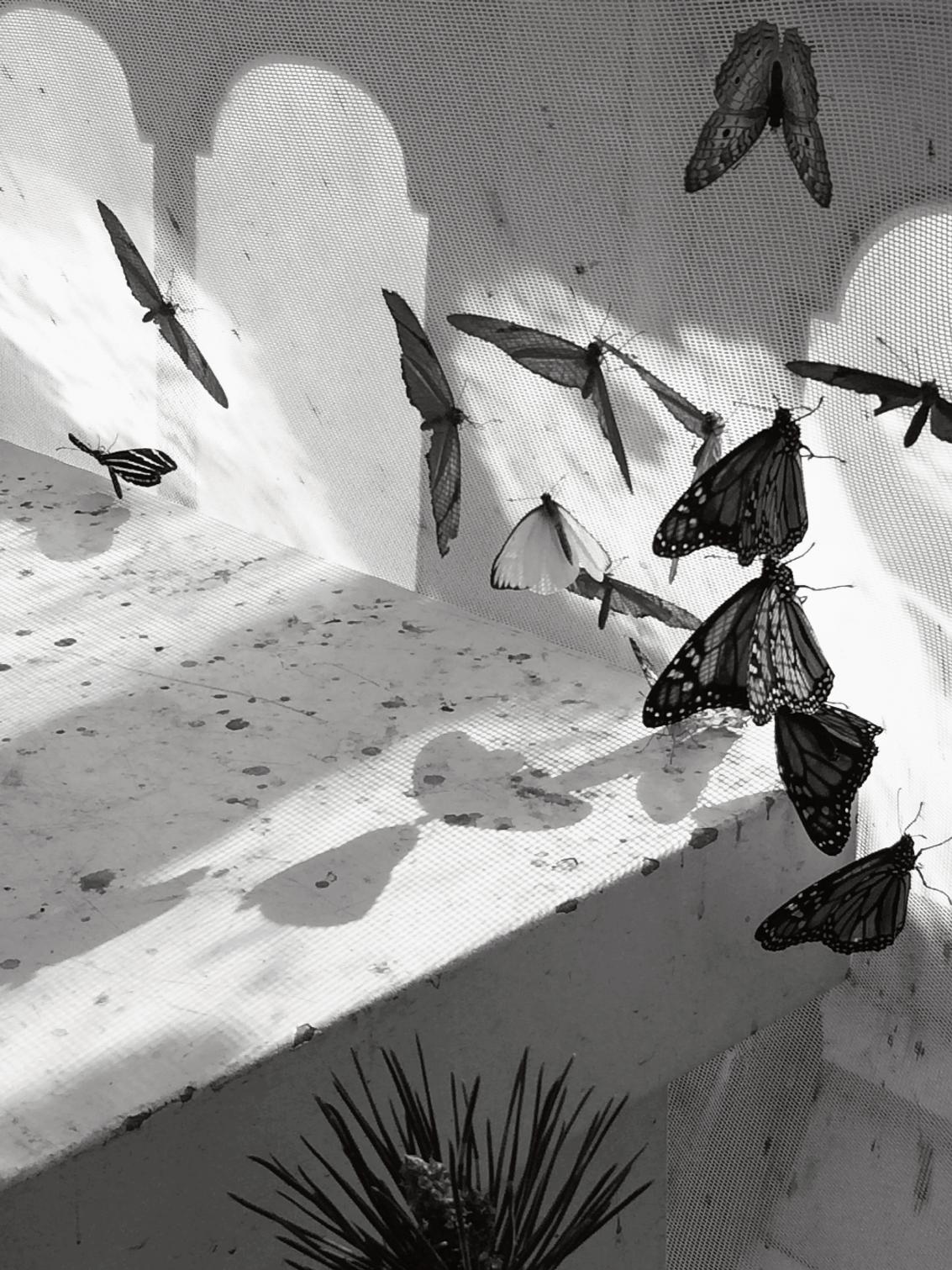
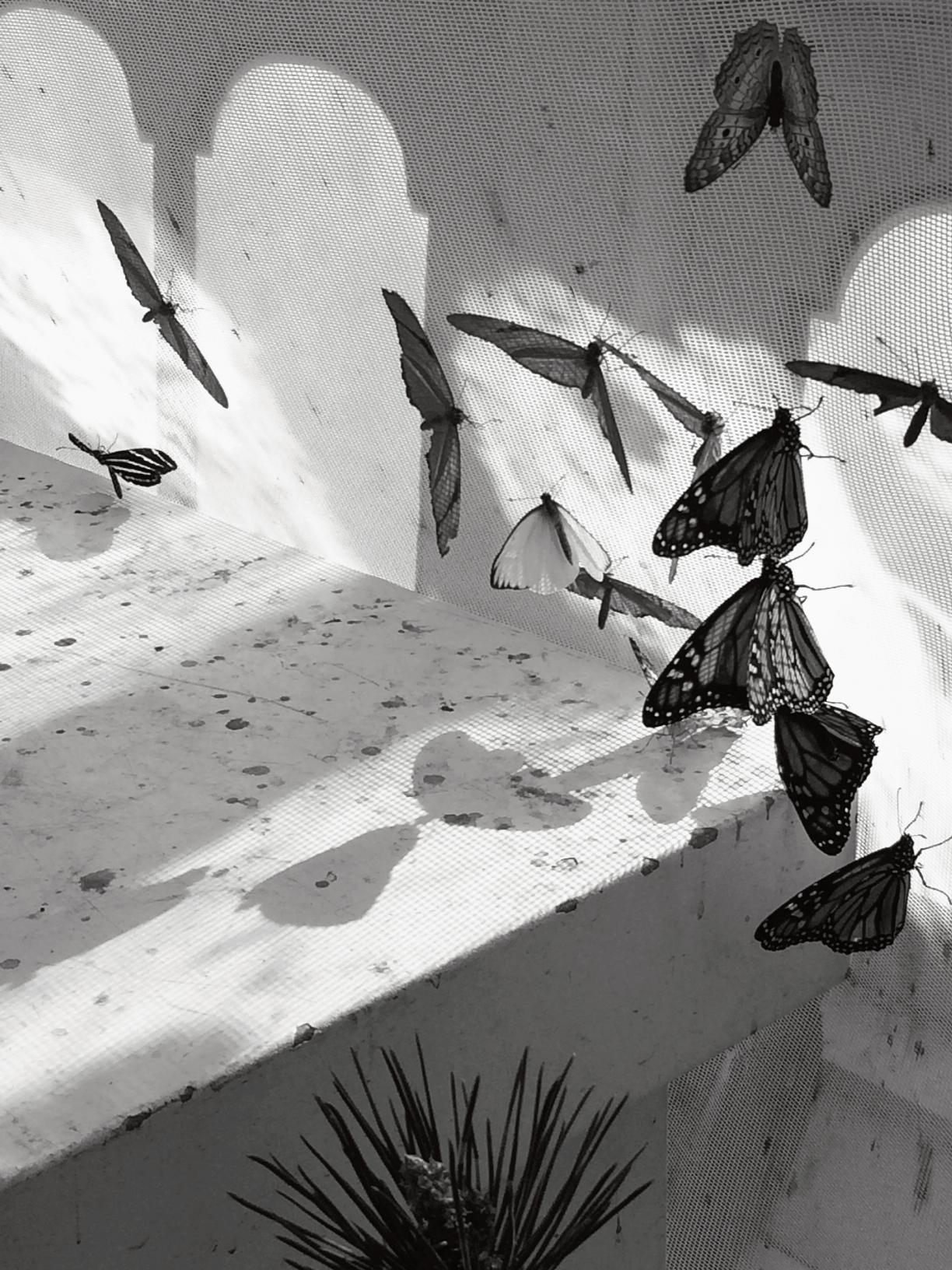
 Kaylyn Bauer
Kaylyn Bauer
T hat the magnolia is bar ren so soon, her petals on the g reen car pet dried in the sun-soaked cor ner of the yard, is strang e. T his only just beg an, & that’s strang e, too. T he untrimmed hair of wild onions reminds me of that one thing I never realized I knew our similarity is that we are spontaneously wild women year ning after a childhood lesson-affected dream of being well-kempt. T he curious bit is that when we act on our desires & fantastic whims is when we are least like that character & most like that child ag ain.
Tea Is Ser ved Fatemeh Mardi



From Painter to Subject
Jason VasserLike a Frenchman on the Riviera overlooking the Mediter ranean, imagining a woman riding a g ondola miles from where his ar ms can reach, he stops and stares out to sea as the breeze car ries her name, g razes his ears as would a whisper. I wait
looking through the oil on canvas for you to appear first as a relief, but then beyond into my hands that ache to soothe the pain, to caress your nape as would a br ush filled with the paint that allows the world inside the mind of a man insane. A voyeur
peering as you pose for my hands to capture the essence of the dance that is your cur ves as you move the mountain within merely by admiring the way you sit, still enough for my br ush to awaken the majesty of your smile, yet f luid as an ocean car r ying the memor y of your name.
Hide and seek,
Fireflies
Annie Graham
Breathless anticipation before discovering
T he f lighty fright of being discovered
Pulling the blanket under which I’m covered
Pee pholes you knew
Tree branches I swung through
All was lost to me
You easily outran my little feet.
Over those hills I f lew
Hearing the patter close behind
Close my eyes, close my eyes
If I can’t see you, then you can’t see me
T he silliest notion I ever believed.
Firef lies escape my hands
T hey dance away out of my g rasp
Trapped inside a jar in your hands
Fear and smiles are now my mask
Fascinated by my glowing eyes
On ag ain, off ag ain like those firef lies
But I can’t dance away
Not like this
Your mouth g rins, my light dims.
Mystified, enthralled, wantonly
Staring at me through a microscope
Seeing ever ything and perceiving nothing
Your air is my smoke; I choke
Prodding and poking
Tickling and touching
I want to throw up.
Smiles so thin
Brief interest and then
Boredom
Lights off
Looking out my telescope
I see your hear t
Held, not touched
Seen, not obser ved
Healed, not medicated
Loved, not admired
My dreams come and g o
But this telescope always points your way
Someday I will take up wings
Leave behind their shackles
I pray, I pray that you see me
T hat you shoot me out of the sk y And catch me.
We will lie out under the stars
Laugh out loud and wig gle our toes
Catch firef lies in our fing ers
Funny looks and wrinkled nose
Winking, wincing, r unning, shouting, falling, f lying Or
Hold each other’s hands and wee p.
Cityscape
Mike Renez

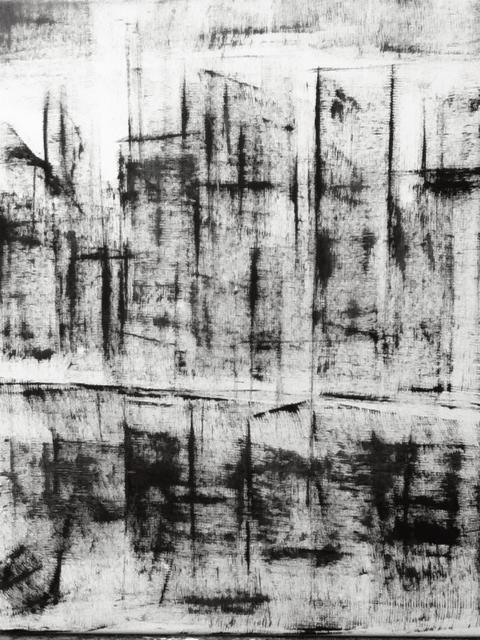
Out on the Town
Arthur MaurerSwer ving, bur ning, we bricked the midnight air with our wounds, subcutaneous and ripe for scotch’s botched suturing. Bellicose, we spat our hells and hyacinths along the walls. T he moon drifted overhead, dr unk, and you, I think, were muted by its halls, its glittering suicide. No g reat bulls could pause our bleated blitzkrieg, which strangled ele phants with its cause and hung the ears of the Nür nberg crowds, whose cancerous eyes cr ucified all. We left the bar, our lungs disemboweled, too webbed with smoke to speak, and landed on some patio. Our cuts spilled through the mor ning sk y sickled diamonds of our youth memos of cold, razor hours. No coffee or cig arettes could assuag e what fresh infections scoured our motley veins. Clinically, we trilled g oodbyes from our cars (our funeral hearses, our matadors), and, de par ting from our surgical dance, I fattened a toilet bowl with my tears.
Thin Spaces
Annie GrahamI car r y a piece of heaven in my memor y. Celtic monks speak of “thin spaces,” places where the cur tain between this world and eter nity is thin, and paradise is palpable. I discovered one of these places when I was ten years old during a family vacation in Florida. T his beautiful boundar y between this world and the next, my personal threshold of heaven, is called Shell Island.
Our little family had to take a special boat just to reach the island. T he isle was far from the shore, so far that it could not be seen with the naked eye. As we left the shoreline, the ocean water g rew darker and dee per and bluer. T hen the island, small and covered in sea g rass, rose up out of the sea. W hen I ste pped foot on the beach, my toes sunk into pure white sand. My siblings and I took off r unning along the bank, and our parents followed closely behind. Within moments, our family escaped the larg e g roup of tourists, and we spent the after noon exploring alone.
T he place resonated holiness. T he sand felt like cotton under neath my tiny feet. T he war m saltwater lapped around my ankles. T he little waves curled and broke around my legs, receding back into the de pths and ref lecting the sun like a silver cur tain being pulled back from a window full of light. Shells of all shapes and colors looked like broken potter y scattered along the beach; my sister and I collected them quietly with contented hear ts. My brother and father dove into the dark waves, and my mother rested on the bank. Our footprints looked lovely, all var ying sizes, as our family raced down the shore. My father picked me up in his ar ms and spun me in the air. T he sound of our laughter mingled with the roar of the waves crashing ag ain and ag ain. I was one with that ocean as my father tripped, and we fell, gig gling, into the sand.
Looking up, I placed my palms f lat on my forehead and wiped the salty hair away from my eyes. One by one, we tur ned our attention to the sea. Our day passed us by, and the sun set over the endless ocean. Rays of g old and yellow light shot across the sk y, illuminating the myriad of clouds and painting the ridg es of the waves. T he only sound was the g entle crash as the sea kissed the shore ag ain and ag ain. As far as my eyes could see, the view was nothing but sea and sk y. We had reached the edg e of the world. I g azed at the horizon: the thin line se parating the sun and shore. Surely, I thought, I would see the g ates of heaven if I looked hard enough. ***
T his place is for me: the park at the edg e of St. Louis. W hen I am lonely, I retreat into the safety of my g reen sanctuar y. After taking off my shoes and socks, I feel the soft and mossy g rass beneath my bare feet. T hey make no sound as I plod through the park on this quiet October after noon. T he leaves are just beginning to chang e. Some of the trees display colors of brilliant peridot, others dee p crimson, and even more are bright as yellow
sunlight. My ste ps take me far from the path and towards the chor us of whispering trees.
W hile I stand beneath the canopy, chinks of stained light f licker between the leaves and war m my face. T hey are my stained glass windows, draping around me and casting mar velous rays of colorful light. T he g reatest painter designed these. I meander towards the larg est one, an ancient oak with branches stretching towards heaven, watching over me from the top of its hill. Up and up the hill I climb until I reach the tr unk of my g reat tree. Lying in the cool shade, I watch its branches bend and sway to reach me.
With my back to my tree, colorful leaves enveloping me in a stor m of stained glass, I quiet my hear t and listen. Birds of all shapes and sounds sing in the canopy above my head. T hey are my church bells telling me to stop and watch and wait. Looking down from the hill, I see ever ything illuminated in g olden after noon sunlight. Tree after tree, row after row, stretch onward and down the hill. T heir branches, like beams of a roof, touch one another. T he mossy f loor of ear th is the aisle r unner beneath them. T he birds and creatures come and g o, singing and praying as a cong reg ation. I pull a jam sandwich and juice box from my bag. T he sandwich is the body, the juice is the blood, and my lunch is my communion. T his place is for me. I have found a cathedral hiding in the woods.
Despite being an adult, I felt giddy as a kid when I climbed up the ladder that first night in my new bed. I ner vously asked my best friend if she minded that I took the top bunk. Much to my delight, she re plied that she prefer red the bottom. I can never par t with my love of high places, especially lookouts and tree houses. My bunk bed is a tree house, a lookout, but it has become mostly a hideout. Now, it is my place of safety.
I love the comfor t, of course. I have the softest blankets, the f luffiest pillows, the most squeezable stuffed animals. But over time, the bed has chang ed from a place of comfor t and rest to a place of safety and prayer. I tur ned it into my own haven of security. T his was a preference at first, but now it is a necessity. Adulthood tur ned out to be much harder than childhood, and I can no long er pacify the pain of g rowing up despite slee ping in a child’s bed. Still, I wrap my residency in innocence, and pray that my decorations shelter me.
Twinkling white Christmas lights hang around the frame, a g arland of sewn stars accenting the rim nearest the door. T he side touching the wall is plastered in safety parapher nalia; an entire section of the wall is dedicated to my dearest sisters, women in my life who have been messeng ers of peace and freedom. I framed their photos in whimsical handcrafted paper. Quotes from enlightened dead people and postcards from friends are tacked up alongside the photos. A few of my own pieces of ar twork my ele phant sketch and my butterf ly painting hang on the wall as well. Index cards with Bible verses are strewn about the eclectic wall of collected ideas and hopes.
On nights when things are bad, when the g rown-up hear tache sets in,
I crawl up there like I would crawl into my tree house as a kid. Clutching my koala stuffed animal, Einstein, I bur y myself under blankets with my back to the wall. T he pictures of my friends smile down on me, and I listen to the jingling of my glass dream catcher hanging above my head. So far, the dream catcher is working. ***
T he war m wooden f loors invite me in ever y time. I cannot walk past my favorite coffeehouse without popping in for just a moment. I am a thief of this place; I steal away inside for a few moments just to inhale the rich aroma of black coffee and cookies brought in from the baker y. At times I am not a thief, but a refug ee. T he larg e windows provide enough light for me to feel a sense of belonging, wrapped in the protection offered by the sun. Often, I sit down in my favorite chair, the one in the cor ner draped in sunlight, plug in my headphones, and watch.
T he barista smiles and brings me the drink I order ever y visit. T hey all know my name now. Ever y after noon the same old g entleman sits in the chair opposite me, looking intently at his monitor. I wonder what he is reading; he always seems quite content. My eyes wander from face to face, and then up to the ar twork on the walls Each month, a new local ar tist is featured. Some works are g rotesque, others quiet and simple, others are black-and-white por traits. I leave the coffeehouse when the paintings are too frightening and threaten my threshold of safety. At other times, I ling er, typing away while sitting under neath a painted mural of a giant tree.
In the mor nings the place is quiet, but on cer tain nights the peace is swallowed up with music and mur mur. Local bands display their talents on open mic nights while old men, clinging to their glorious hippie days, nod in the cor ners and snap their fing ers. Young girls, usually a little tipsy, dance and twirl in new dresses. I am always in the cor ner, clutching my mug filled with the drink I always g et, watching. Each evening brings a new face, but the new faces begin to look the same after a while. I will allow my foot to tap away for a few moments only, then I am out the door. T he clamor, the stench of alcohol, the darkness they tur n my coffeehouse into a different place. I do not ling er there.
***
On some nights, I stand at the cor ner of Jefferson and Main. Jefferson marks the split of two lifestyles. To the left side, the street is quiet and peaceful. All the little shops, and all the little shop owners, and all the little people who shop there, are tucked away in bed. War m streetlamps light the empty street, and the quiet shops have friendly signs that kindly tur n visitors away.
T he right side, however, is another stor y. T he right side is for the throbbing nightlife, young men and women looking to g et luck y. T he clanging of beer bottles, dee p-gutted laughter, and clacking of high heels echo down the alleyways. Clubs throw open their doors, and neon lights hum in their black windows. I wait quietly. Flames of cig arette lighters f lash brightly
through the sapphire and amber bottles in the hands of the mur muring nightlife. I see a f lash of colored light here and there, like stained glass taken from a window. Glancing down, I see a r uby bottle smashed over the bricks. One of the quotes hanging above my bed comes to mind: “I never knew broken glass could shine so brightly.” I did not know until that moment that I could feel empathy for a vodka bottle. We are one and the same.
I wait at my cor ner on Jefferson and Main, for neither right nor left side suit me. Crowds of young people stream into the church, located oddly, between the bars. I watch the cong reg ation, wondering if I would find shelter among their ranks and security within the walls of their building. But instead of wandering towards them, I tur n and look towards what waits behind me: the park, the trees, and the g reat river rolling beyond. Tiptoeing forward, I look on in silence. T he trees whisper and sway. Squinting, I tr y to discer n what lies beyond the river. All I can see is the thin line that se parates the shore from the sk y of darkness. A sprinkling of white stars shines above the tree line. I walk forward, g azing at the horizon of dee p blues, g rays, and sparkling silver. Surely, I think, I will see the g ates of heaven if I look hard enough.
720 Hexagons


Matt Colonna

Hawaiian Breeze
Emma FigueroaMidwester n summer on the second f loor, and I see how you feel. Your hair is glued like a frame around your face musk y sweat, the bonding ag ent you never wanted.
Tr ust that my dusty face will tur n on its long white neck to follow you through ever y cur ve of the room.
Let me take you where my packaging promises.
You have no wor ries here. Sit back, lei laden, and sip on your umbrella drink. Let my cool breath wash over you with its low hum. Watch the hula ladies.
Lady Mercur y Katryn
DierksenT here is a tiny woman in my head. She is well-dressed, draped in white, her shoes bright g old. Her lips are taught & wr y, sometimes pulled into a smar t white smile. Her eyes are a strang e dark hazel leering over multicolor kaleidoscope shades, often down at a book, often at the camera lens. She doesn’t speak not out loud. She is a waiter; she waits. At tables. On street cor ners mostly. She knows most about people. W hen you look at her, sometimes she is hard to see, because you aren’t sure you’re not looking at yourself. She has a Gemini hear t, hence a Gemini hand. W herever she lurks, in the broad daylight, you are safe. Sometimes, I g et wor ried. I think she might be me. I’m never quite sure.
Gabriella Black Dance
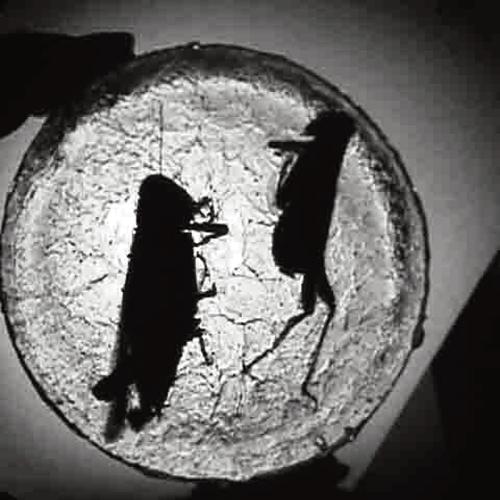
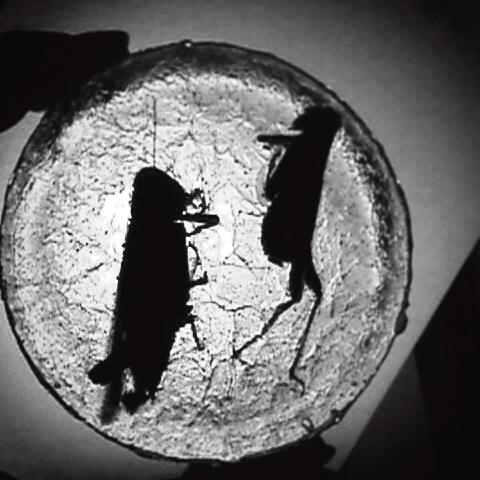
A Trip Across the Countr yside
Arthur MaurerStaccato, the rolling fields, the sk yline poised for self-destr uction. T he clouds ar rang e in a cheap Michelang elo imitation, Adam’s hand (my own perhaps) reaching out into a pocket full of wind. One can hear (if you listen closely enough) Mozar t pre paring for war from the rising asphalt hills, drafting each ascending automobile for a blood-bathed orchestra, outfitting each eagle above in Stuka attire for crescendoing air raids over cor nfields.
T he sun seems to set the bar ns ablaze. Inaudible sirens tremble from the radio static. And our four heads hung over, empty, with hair that blows as carelessly as g rass seem g eared for slaughter, the dashboard window revealing a projector screen for the coming stor m.
A Feather of a Phoenix
Mike GamacheIf I take a feather from a phoenix, Will it bur n away when it dies?
And when it throws itself into the f lames, Will the feather wilt into ashes?
And when the phoenix is rebor n, Will the feather become whole ag ain, Decorated in the red, majestic f lames
It was covered in before?
Or will the feather simply sit in my hand
With no chang e at all?
Summer Soba
Glene G. Carranza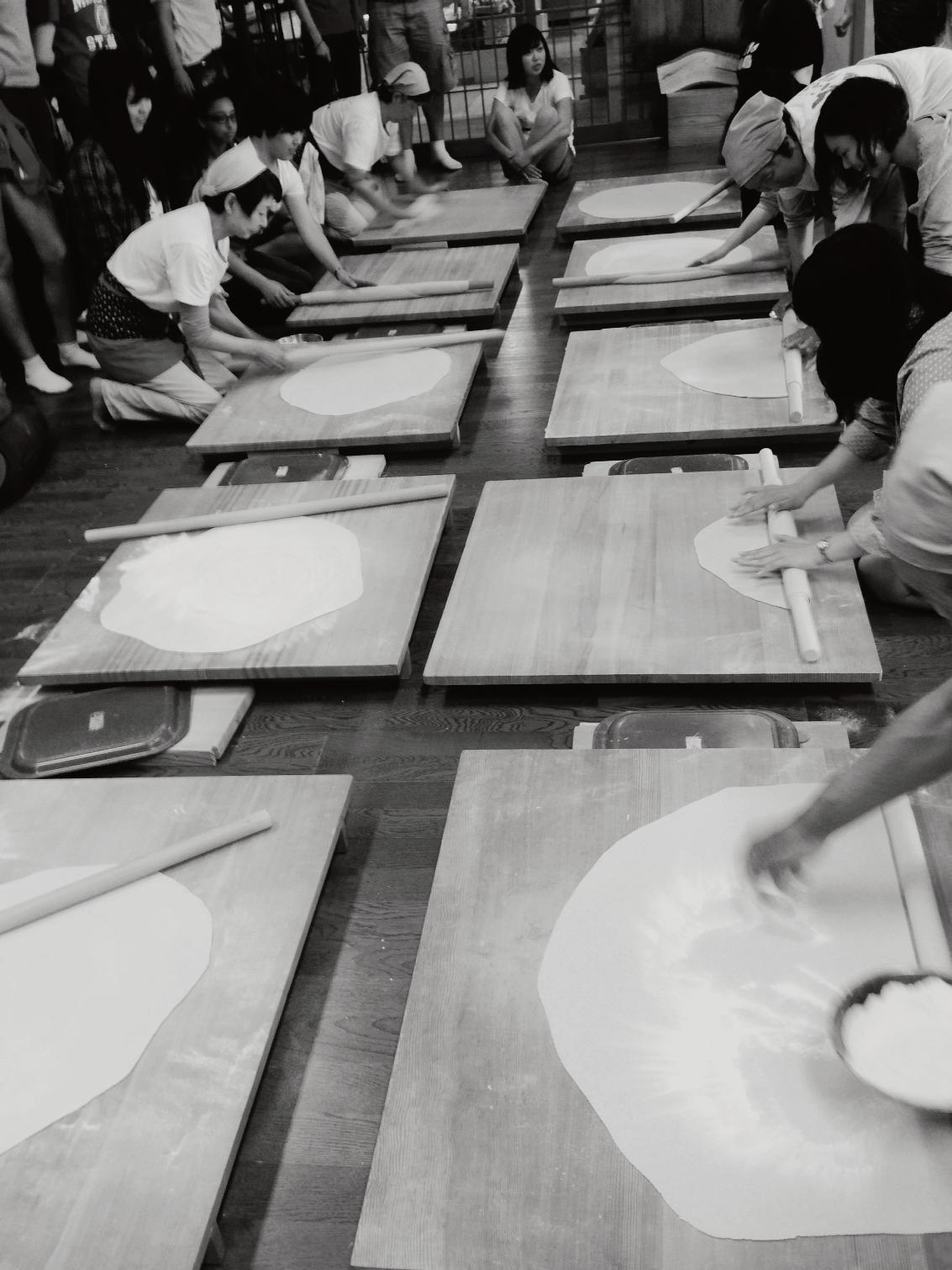
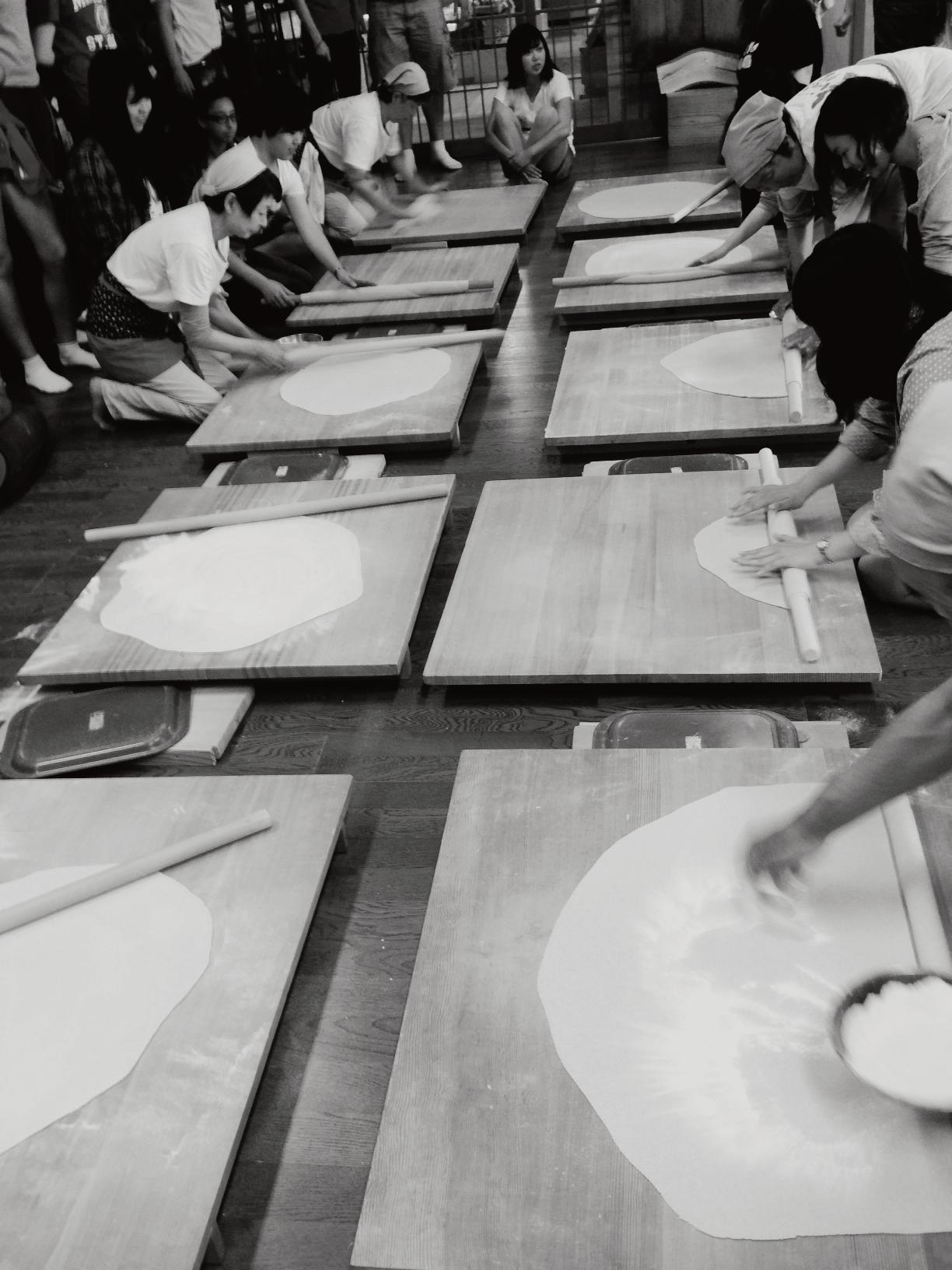
T he young g row up and out and upon themselves so fast. Even they cannot kee p up with it, let alone tame it, and so it just happens. With breath-taking we older ones (who were once there but can never remember exactly what “there” was like) also lose pace and are outdistanced. With the common and usual luck, g ood for tune, whatever, we all sur vive long enough for a reckoning and a reconnaissance, and can talk tog ether of young er times (ours and theirs) and chances g ained and lost. And there is sometimes sadness in that, and there can be worse. But the g ood for tune is that there remains the conversation to have.
And other times, when our luck is worse, the talk of life is cut shor t, a par ty absents, and we are left to chat with a trajector y. T he best and least we can ag ree is that it was an upwards cur ve.
Yesterday’s Clothes
Katryn DierksenI’m the sor t who bathes and then puts on the same, dir ty, days-wor n clothes.
Only poets understand me. Not your poets, but my poets. (You didn’t know I have poets?) No, I don’t mind what K ant says they sound lovely to me. (He sounds lovely to me too.)
T hey don’t speak for me anyway; they speak to me & I speak to them too see it’s a conversation like this
see we can All speak to one another. A poet told me foot soles make electromagnetic connections with the ear th. Sometimes I walk out barefoot, but I did that before it’s only now I know why.
So what?
Maybe I’m barefoot more now.
So what?
T hey told me today in sweet voices that I g rant authority, that I outg rew this town years before I outg rew this town.
I already knew that, but I liked the way it sounded still. So what?
No, listen, (She would say that LISTEN
I’m not better than it; I love it so the way you love a bald dandelion having blown its tuft off into the late summer wind. I love it.
T he entr y date is wrong Does it matter which day I wrote it? So what?
I took a bath & put on Yesterday’s clothes.
Sharp Corner
Mike Renez
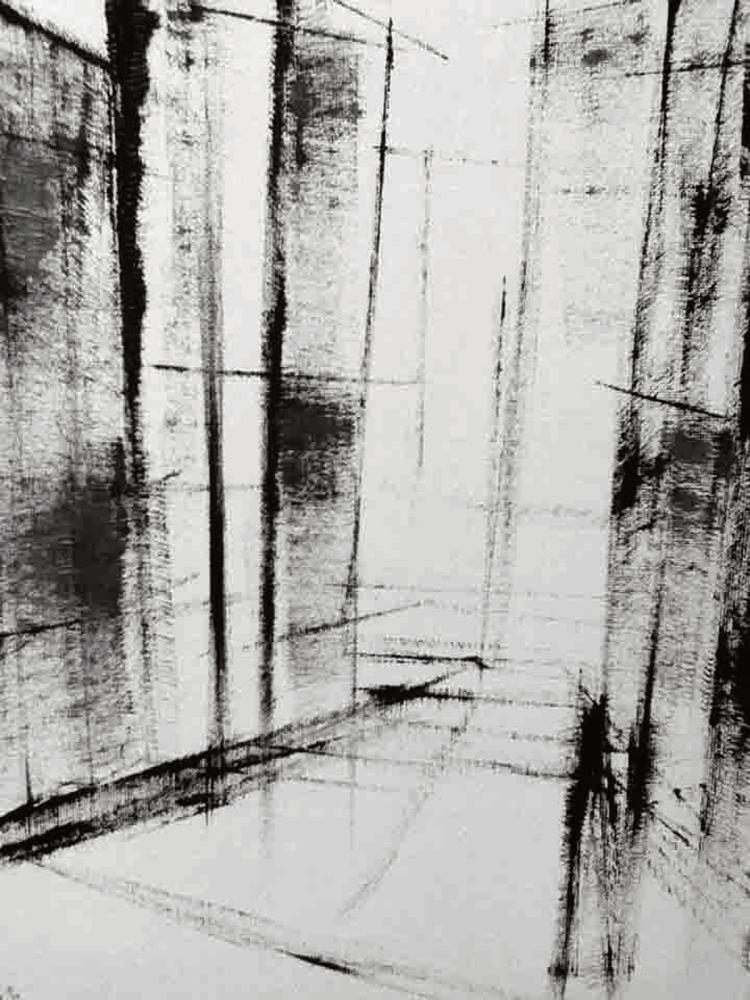
Excellence in Writing 2013-2014
The Pierre Laclede Honors College
Join us in cong ratulating the winners of this year’s writing awards!
1000-Level Writing: Mar ta Kersulis
“Techniques and Goals of Orchestra Adver tisements”
Written for Honors 1100, taught by Dr. Kim Baldus
2000-Level Writing: Alicia Jessmon
“Sensual Beauty and Violent Beasts: Sexuality in Beauty and the Beast ”
Written for Honors 2010, taught by Mr. Dan Ger th
*3000-Level Writing: Madison Emerick
“To Kiss and Tell”
Written for Honors 3020, taught by Mrs. Geri Friedline
4000-Level Writing: Elizabeth Miller
“Sanctioned Social Evil: Textual Exploitation of the Prostitute in Victorian Discourse”
Written for Honors 4900, taught by Dr Kim Baldus
*Denotes featured essay contest winner
To Kiss and Tell
Madison EmerickI discovered Prince and Phil Collins the same year I bought a thong and had my first kiss. My first kiss was how I imagined all first kisses g o: slobber y, with one too many hands on my ass. Perhaps it was the butt g rabbing or that last shot of espresso, but there was something about that kiss that left him mystified and me with a stomach knotted in ner ves.
T he kiss was nothing like the movies; it wasn’t raining and there weren’t any stars. All that hung above us were my parents’ curfew and the tiny slab of black roof over the front door. It wasn’t a private moment we could share between just the two of us, either. T here we were: me, him, and the dog that was streaming snot stains across the glass door.
T he weather was hotter and stickier than the kiss we shared. T he wind seemed to hold its breath as it stared. T he cotton white dress I’d chosen clung to my skin, glistening in sweat beneath the porch light. T he light my parents’ ever-persistent reminder I was not alone. We seemed to be watched by the darkened windows of the house. But we left those windows in steam from the outburst of teenag e hor mones and French kissing even they couldn’t bear to watch the awkward bumping of noses and clashing of teeth.
He left me on the front porch with fing ers trembling above my lips and the branding of his hand across my butt. My lips felt full and swollen. It was as if I had a fat lip, still numb and tingling from the remnants of a Novocain shot at the dentist’s office. As his black Nissan Altima pulled away from the drive, I faintly remembered a kissing scene from a book I’d once read. T he kiss had been described as fireworks, our kiss had lit up like a punk to a fuse and then fizzled out like a dud. I excused the kiss, though, because I thought I might have been too distracted to notice any fireworks with the curious onlookers from the front door T he cat had joined the dog to watch I felt like an animal at the zoo. ***
He took me to a record store that smelled like cheap incense and a cig arette box. T he white-washed walls were stained with a coat of g reasy yellow from the smoke. I wandered up and down the aisles, reading the names scribbled in Shar pie on the tabs in the rows of records. Occasionally, a name or two would catch my eye: T he Rolling Stones, T he W ho, Pink Floyd. I checked out the cassettes for a long while. Some of the cassettes had various ar tists written on the labels like old mixed tapes. I rif led through a few, pondering who would actually buy them. I hadn’t seen a cassette tape in years, much less an actual cassette player. But they seemed to match the feel of the rest of the record store: outdated and living in a time that was long past.
I continued to per use the rest of the shop and stopped when I saw Pur ple R ain. I recently heard Prince’s “Raspber r y Beret” on the radio and added ever y one of his songs to my online playlist. I picked up the faded old
record covered in a new glossy sheet of plastic. On the cover, the white words Pur ple R ain ran across Prince’s forehead. He loosely held a guitar in his hands and seemed to be looking off somewhere behind me. He wasn’t playing, just posing.
I placed the record back in the cardboard box. I didn’t have a record player, anyway. I found my date standing on the other side of the record store. He had a few records tucked under neath his ar m and was thumbing through more. We talked about his records and the new player he’d bought. He cared more about that record player than he did about g etting into my pants, stowing it out of har m ’ s way when we g ot too heated. He wouldn’t let me touch the records or his headphones. A bottle of hand sanitizer was at the ready if I g ot too interested.
We prattled on about his exciting finds before he stopped, his face twisting in ang er. “You can stop pretending. It won’t make me like you any more.”
I wasn’t sure how to respond. My brain slug g ed behind as my mouth star ted to r un, “W hat? But we were just talking . . . ” Had I seemed too eag er or asked too many questions? I was excited to be on a date with him, but it wasn’t as if I were tr ying to g et him to like me. Weren’t you supposed to g et to know each other on a date?
“I just wanted to know more about it; your records and player seem so impor tant to you, ” I finally said after the stupefied daze wore off.
“Oh,” was all he said in response before launching back into the previous conversation.
Although confused, I continued on the date as though nothing happened T hrough dinner at a T hai restaurant down the road, I continually replayed his words in my mind. I became more and more upset with each rewind. Ang er beg an to skitter off me like I was overcharg ed with electricity. He asked if something was wrong, and instead of f linging the water I was drinking in his face, I re plied, “No,” through g ritted teeth. As if the waitress could sense my ang er, no one had been seated around us, although the restaurant was pretty empty. Much like the food, there wasn’t much to say about the restaurant. It was fairly r un down but clean. T he walls were in dire need of a paint recoat, and the fur niture had seen far better days. My ang er seemed to teeter like the table ever y time he bumped it with his leg. It threatened to topple over at any given moment.
By the time he dropped me off at the house, I er upted in front of my mother. I spat molten ash across the living room and I shouted obscenities and insults as I paced the perimeter of the room. W ho did he think he was? And who the hell was I? I hadn’t said anything. I should have pied him in the face with my plate of noodles. For such a hard-hitting feminist, I felt like a hypocrite. Even so, by the end of the evening with an empty tub of chocolate ice cream and an apolog y from him, I decided I just took things the wrong way. T he friend who’d set us up assured me he didn’t mean what he’d said.
A wall of fire crackled before my eyes. T he boys had built a larg e bonfire much big g er than necessar y to show off their camping skills. It was probably just what they’d lear ned in Boy Scouts as kids. T hat’s something Girl Scouts should have pre pared me for. Instead of teaching me how to guilt my g randmother into another box of T hin Mint cookies, they could have taught me how to sur vive in the wild, how to build a fire.
I held a wooden stick with a marshmallow stuck on the end. Ever yone slowly roasted their marshmallows out of the f lame’s reach. I stuck my marshmallow into the middle of the fire, watching it bur n and the white skin bubble and char. I pulled the stick out of the fire. T he marshmallow danced in f lames before I blew it out. I ging erly peeled off the outer-layer of the marshmallow until all that was left on the stick was the white, g ooey center. I loved eating bur nt marshmallows almost as much as the fire-roasted hot dogs I’d had for the first time earlier that evening.
He sat next to me and made faces while I continued to bur n the marshmallows. He thought I was doing it by accident before I told him I liked them that way. I still don’t think he believed me. He had to roast me a marshmallow the “right way. ”
We sat around the fire and talked about colleg e and our futures. T he last of the sun faded into the black night sk y. T he hum of crickets seemed to drown out our conversation. As the fire died down, and the mosquitoes saw their chance to feast, we headed into the camper parked several feet from the bonfire.
As ever yone else headed in, I took a bucket of water and slowly killed the remaining fire. Steam faded into the cool night air. I didn’t know how to build fires, but I knew how to put them out
We were lying on the hood of the Cor vette watching the sk y. He was there too, for once quiet, just watching. T he stars prickled the black canvas, occasionally blinking before painting their final mark across the sk y. T here were hundreds, maybe thousands, of firef lies around us. So many that we couldn’t actually tell the difference from the stars and the firef lies. T hey all seemed to move in one mass tog ether, slowly waving back and for th like the hand on a metronome.
It was so dizzying to watch that I almost felt sick, like when you have one too many g o-rounds on those spinning bar rel rides at the car nival. I had to look away towards the lake, but it was like a mir ror. If you took a picture, you would not know which was water and which was sk y. A bug or bird would occasionally disr upt the perfect imag e, sending ripples across the dark and ref lective surface.
We stayed there for who knew how long. According to my cell phone, it was only ten minutes, but it seemed like a moment that lasted forever, us girls lying there tog ether while the boys poked around at the water’s edg e. A tr uck pulled up next to the Cor vette on the g ravel. I could already tell from the yelling inside the tr uck that they were just a bunch of dr unks.
Several men in plaid and a few girls scantily clad in bikinis clambered down from the tr uck bed and cab. T he dr unks star ted yelling and charg ed for the lake, ripped off their clothes, and ran stark naked into the water, beers still in hand. We girls aver ted our g aze from the scene. T he boys leaned forward, intently watching the girls while holding their breath in anticipation to see more skin.
It became pretty clear we girls star ted to feel uncomfor table, so we decided to leave. With relief, I climbed into his car. We waited until the Cor vette backed out and followed it back to the camping site. As he drove, he tur ned on his CD player. T he stereo belted out Genesis, and I nearly g roaned. T he whole way down he listened to Genesis, and he refused to play songs out of track order, let alone switch to a different ar tist. By the end of the after noon when we’d stopped for lunch, I couldn’t stand his presence. He complained the whole way about my water bottle and the noise it made in the side of the door. Annoyance pricked my mind just thinking about it.
I took in a calming breath. Something told me our relationship would end in hear tbreak ver y soon. I sighed at the thought of having wasted my first kiss on him. I’d been saving it for someone special. As Phil Collins put more silence between us, I looked out the car window, wondering when we would finally end.
Biographies
Bauer, K aylyn
K aylyn Bauer is an underg raduate seeking a BS in biochemistr y with a minor in psycholog y. She plans to g o to g raduate school. She enjoys working with Dr osophila melanogaster in the lab of Mindy Steinig er, PhD on nor th campus.
Berg, Ter ri
Ter ri Berg g raduated in May 2014 with a bachelor’s deg ree in fine ar ts for painting and a minor in ar t histor y. She plans to pursue a master’s deg ree in studio ar t and to become a colleg e professor as well as continue her life as an ar tist. Inspiration for her work comes from exploring contemporar y nar ratives of time and place. Cur rently, her work is driven by interactions with figures in work and domestic environments.
Black, Gabriella
Gabriella Black is a senior pursuing a bachelor’s deg ree in interdisciplinar y studies. She is also a wife and stay-at-home mom. Upon g raduation she plans to seek a master’s deg ree in counseling. Light and shadow are the inspiration for Gabriella’s photog raphy. She tries to capture the evocative nature of light and demonstrate its effect on the subject.
Bliss, Rober t
Rober t Bliss was bor n in Oreg on, g rew up in Iowa, studied in Pennsylvania, Wisconsin, and Oxfordshire, and worked in Lancashire, but he didn’t star t writing poetr y seriously until he moved to Missouri. If anyone can explain that oddity to him in 250 words or less, he will be g rateful; iambic pentameter is not required, and Belleri ve should be mentioned. Rober t lives in the City of St. Louis and likes it ver y well. He is husband of Paulette, father of Daniel and Greta, and father-in-law to Dan. His cats have been legion, but only Humphrey (tuxedo cat, male, 15 years old) sur vives.
Brooks, Ryan
Ryan Brooks is an underg raduate economics student. He enjoys theater, film, data, reading, and baking cookies. He works for The Cur r ent as the photo editor, and for UMSL’s Office of Residential Life and Housing as a marketing assistant.
Br ummett, Abram
Abram Br ummett g raduated from UMSL with an MA in philosophy in May 2014. He says the most rewarding par t of his time at UMSL was teaching underg raduate philosophy courses. He wrote his poem for a philosophy of religion class that he taught during spring of 2014. According to Abram, his poem ref lects his contentious belief that many of our moral beliefs are the result of evolution and expresses his g eneral dissatisfaction with otherworldly directed attempts to answer philosophical questions.
Burkett, Sean
Sean Burkett is an underg raduate psycholog y major from Grand Rapids, Michig an and has plans to receive a PhD in clinical psycholog y. He has a passion for g eolog y and decided to put that passion into words, even though it may seem odd to an outside eye. In his free time, Sean enjoys rock collecting, movie watching, and people watching.
Car ranza, Glene G.
Glene G. Car ranza’s adventure beg an when, at the ag e of four, he mig rated to the United States from the Philippines. He is cur rently a student at UMSL, a bar tender at the Saint Louis Ar t Museum, a marketing inter n for O’Fallon Brewer y, and a volunteer culinar y instr uctor for Operation Food Search. After changing his major several times, he finally chose to study Inter national Business. Watching enough Travel Channel and Food Network inspired him to choose his discipline. Glene enjoys meeting people from all par ts of the world, and he believes that eating their food is a simple way to star t lear ning their culture. Glene’s main inspiration is, simply, the world. But he says that sometimes he puts his camera down during the most significant moments of “conquering the world” because “some moments are best seen with just your eyes. ”
Christmann, Samantha
Samantha Christmann is an underg raduate majoring in fine ar ts with an emphasis on drawing and painting. She is a fir m believer in “the full (not star ving) ar tist” and teaches painting classes in Chesterfield on the weekends. She dabbled in photog raphy, fiction writing, and environmental studies at three previous schools. Samantha has been in school since 2008 and is on track to g raduate from UMSL in May 2016.
Colonna, Matt
Matt Colonna is an underg raduate at UMSL, majoring in astrophysics. He hopes to work for National Aeronautics and Space Administration studying planets in other star systems. In the Alchem y drawing, featured alchemical symbols were drawn in charcoal and chosen from the album ar t of Rush’s Clockw ork Angels.
Dierksen, K atr yn
K atr yn Dierksen is an English major in her junior year at UMSL. She is an occasional ar tist of various media perfor mance, pen, and br ush. K atr yn enjoys the process of creating in any accessible for mat. She cur rently concentrates her effor ts on the production of the Pier re Laclede Honors Colleg e ’ s two publications, Brain Stew and Belleri ve. K atr yn is excited to have her poetr y featured for the first time in Belleri ve, and she hopes to contribute to other publications in the future.
Eikmann, Jessie
Jessie Eikmann is an underg raduate English major with plans to work in publishing. She has also been published in Litmag and was a finalist in a Missouri State Poetr y Society contest. Jessie claims she is wired a little strang ely, and would have it no other way. Some of her creative strategies include channeling imaginar y characters and writing on random Post-it Notes like a 21st-centur y Emily Dickinson. Jessie has somehow manag ed to tur n her catastrophes into ar t and encourag es her fellow basket cases to do the same.
Emerick, Madison
Madison Emerick is an underg raduate student in the De par tment of English. After completing her bachelor’s deg ree in spring 2015, she plans to pursue an MFA in creative writing. Madison draws on personal experience as inspiration for her writing. She uses humor to make light of mundane or unfor tunate situations. Many of the pieces she has written are derived from events in her life.
Figueroa, Emma
Emma Figueroa is a senior pursuing a bachelor’s deg ree in English. She is planning to g raduate in December 2014. Emma, a Spongebob aficionado, loves baking and spending time with Byron, her equine companion. Much of her life is consumed by driving, when she drinks unhealthy amounts of coffee and thinks of her next poem.
Gamache, Mike
Mike Gamache is a g raduate student from UMSL, holding a deg ree in English as well as a cer tificate in creative writing. Mike enjoys death metal and consistently listens to it while working on any piece of writing or assignment. He cur rently is working on his first book, Hear t Sync, and is drawing on ideas for a second book, No Evil. One of Mike’s longtime dream jobs would be writing plots for a video g ame company.
Graham, Annie
Annie Graham is an underg raduate liberal studies major, minoring in histor y and pursuing an honors cer tificate. Annie is on the path to receive her deg ree in December 2014. She describes “meeting God amid the chaos” as her major source of inspiration. Annie’s writing comes from her own experiences and is open to her emotions and senses. She also has a knack for memorizing poetr y. Her favorite poem of all time is “T he Hound of Heaven.” Annie loves being outdoors, mountain biking, reading, and drinking way too much coffee. Fiction and memoirs are Annie’s favorite g enres. Annie’s submitted work is dedicated to her family, Olivia, and Kimberly Mae.
Imperiale, Sam J.
Sam J. Imperiale g raduated from UMSL in May of 2014 with a BA in English, a creative writing cer tificate, and a Pier re Laclede Honors Colleg e cer tificate. He is cur rently pursuing an MFA in creative writing at Lindenwood University. Sam works par t-time for T he School of Professional and Continuing Studies at UMSL. He was on the staff of Belleri ve ’ s four teenth issue, Chimera. He was also on the staff of the 2014 edition of Litmag. T he inspiration for Sam’s writing comes from his life experiences. He was a Marine on active duty for eight years and a car penter building new homes in St. Louis for twenty-two years. Sam says that his writing is a “bittersweet” ref lection of the life that he has lived.
K aufman, Heather
Heather K aufman g raduated from McKendree University with her BA in English in 2009. She is cur rently pursuing her MA in composition studies and working as Associate Editor of Periodicals and Consumer Books at Concordia Publishing House. She is a Des Lee Scholar. Her publishing credits include Litmag, The Montage, The McKendr ee Re view, Scholars: The McKendr ee Jour nal of Under graduate Resear ch, Nor th Central Re view, Belle ville, News-Democrat, and Lipstik Magaz ine. Oddly, Heather does her best composing in the shower, where it’s hor ribly inconvenient to write anything down.
Kr ugh, H. M.
H. M. Kr ugh is a May 2014 g raduate of UMSL. She worked on the Editing Committee for the four teenth issue of Belleri ve, which inspired her to submit her works for this issue. She is cur rently pursuing an MBA while continuing to write occasionally for herself. W hile H. M. prefers to be on the publishing side of literar y works, she also enjoys sharing her poems ever y so often. She hopes never to leave the literar y world, despite possessing aspirations to r un her own business.
Mardi, Fatemeh
Fatemeh Mardi is a doctoral candidate in education at UMSL. Her g raduate assistantship is in science education cur riculum development, and she teaches Education Technolog y as an adjunct faculty member. With a BS in engineering and an MA in TESOL, Fatemeh has more than ten years of teaching experience in elementar y school, middle school, colleg e, and languag e institutes. As an Iranian-American, she combines her worlds and cultures. Her daughter is lear ning the rituals of hosting guests in Tehran. Tea Is Ser ved is an imag e of her daughter eng ag ed in imaginar y play with an authentic samovar, which was used to brew and ser ve tea in the old days. Small hourglass-shaped cups are used to ser ve tea with saucers beneath them, and sug ar cubes are offered on the side.
Maurer, Ar thur
Ar thur Maurer is an underg raduate English major with plans to work or teach in the publishing industr y. His writing is inf luenced by a wide rang e of writers who focus on the sur real, the ver y real, and the confessional. He finds his muse in the City of St. Louis, which ser ves as a source for many imag es, moods, and characters. Ar thur’s interests include anything that is sublime, beautiful and profound, and anything dealing with the darker aspects of human nature. His hobbies include listening to music (par ticularly classical), reading, taking walks, watching movies, tr ying new things, and daydreaming.
Mor ris, William
William Mor ris is a senior at UMSL pursuing a bachelor’s deg ree in English with an emphasis on creative writing. He has worked on the staff of previous issues of Belleri ve, including Penumbra and Chimera, and his poetr y and prose are featured in those publications. William says he “might be writing a novel.”
Myer s, Sarah
Sarah Myers is an underg raduate in her senior year in the School of Social Work. Sarah has hopes to complete the MSW prog ram at UMSL to obtain her master’s deg ree and then obtain licensure as a clinical social worker. She has published many works and sold many photog raphs in the “Celebrating the Ar ts” jur y ar t show hosted by the Pier re Laclede Honors Colleg e. Photog raphy is Sarah’s favorite pastime and has become a passion for her. As long as nature, wildlife, and human beings exist, Sarah will have her camera.
Renez, Mike
Mike Renez is pursuing a bachelor’s deg ree in fine ar ts. Mike has been creating things since he was a child. As he g rew up, he wanted to do ever ything with ar t but realized he needed to find a specific focus. He then tur ned to painting; he says that it was the best decision that he has made because now he thinks more dee ply about his work and what imag e he wants to project from his mind.
Scholl, Amber
Amber Scholl recently transfer red to UMSL and is majoring in English and minoring in Spanish. She finds inspiration to write anywhere and ever ywhere, which is why the notes app on her phone is filled with ideas, poems, and tidbits that have resulted from moments of inspiration away from home. Besides writing, her hobbies include reading, crocheting, and tr ying out craft ideas from Pinterest. Amber enjoys spending time with her family, friends, and pets.
Selimovic , Ena
Ena Selimovic was bor n in Yug oslavia, g rew up in Turkey, and calls the United States her primar y home. She completed her BA in English at UMSL in 2012 and attended Trinity Colleg e in Dublin for a deg ree in comparative literature. She is now back at UMSL as an office and research assistant in the De par tment of Anthropolog y, Sociolog y, and Foreign Languag es.
Vasser, Jason
Jason Vasser is a g raduate student majoring in fine ar ts and an assistant editor of Natural Bridge, a jour nal of contemporar y literature. His work has appeared in The Sphinx, Prairie Gold: An Antholog y of America’s Hear tland, and Litmag.
Jason also has works for thcoming in Callaloo, Common Gr ound, Pebble Lake Review, Naugatuck Ri ver Re view, and other publications.
Staff Notes
Faculty Advisor
From the ver y beginning of our work in early spring, I had high hopes and high expectations for the newest issue of Belleri ve. As summer prog ressed and some tr uly remarkable submissions were pre pared for the fall seminar, those hopes and expectations blossomed. During fall, as I saw the professionalism and dedication of this year’s Belleri ve staff during selections and production work, I knew without a doubt that Issue 15 would be both a notable milestone in Belleri ve histor y and a welcome addition to the Belleri ve set.
T he process of creating a new issue has been an experience of both remembering and lear ning. Reminder #1 making a book is serious business. Tough decisions, long hours, countless details, and production deadlines must be manag ed with dedication and g race. Reminder #2 a bit of humor helps. W hen you read the staff notes, you will see how a mix of humor and seriousness contributed to this issue. Now for the lear ning: each issue offers a plethora of individual and g roup experiences that show me new ways to balance the seriousness and the humor in ever yday life.
Solipsist includes a diverse mix of works that ref lect both seriousness and humor. T he individual subjectivity that is sug g ested by this book’s title is paradoxically offset by shared experience when published works and readers connect. Much like the solipsist perspective that personal experiences are private and that another being’s experience can only be known by analog y this book includes nar rators, characters, and featured works that offer readers an oppor tunity for analog y to play a significant role in memor y, creativity, emotion, explanation, and meaning. T he featured works in this book also offer readers a significant oppor tunity for ref lection and enjoyment.
T hanks to all who have suppor ted Belleri ve during our first fifteen years. Special thanks to all who contributed to this issue. I hope you enjoy Solipsist as much as we enjoyed our experiences in bringing this book to you.
Geri FriedlineMost of our job as ar t editors has been to conver t all the submitted ar t to black and white and present it at its finest to the class. If a person were to eavesdrop on an Ar t Committee meeting they would most likely hear things like:
“A little more saturation.”
“Okay, less exposure.”
“Well, more than that.”
“W hen is the pizza g etting here?”
“How do we do this ag ain? I’m g onna Google it.”
Going through the ar t, we were in constant awe of the level of talent people possess to create such beautiful imag er y. T he camaraderie among the members of the Ar t Committee (along with the addition of pizza) made the sometimes more monotonous tasks g o by painlessly. T his year we were able to g et through the conver ting fairly quickly (probably due, in par t, to the entire committee’s anxiety over g etting things finished in time). Because of this, we were able to dedicate a lot of time to our favorite par t creating the cover of the book. We loved being able to work tog ether creatively to design a cover that we hope most people will appreciate.
We consider it an immense privileg e to be able to work with such talent and to be a par t of the continuing leg acy of Belleri ve.
Editing
Before the word there was Greg g. And Greg g g ave shape and for m to the word. And it was g ood. And Sabin, a follower of Greg g, wrote down the saying of Greg g in The Gr eg g Ref er ence Manual. And it was ver y g ood. And the Em Dash was king among them. And unto his people he bestowed a multitude of unleavened bread laden with sauce and cheese. And it was ver y, ver y g ood. T hey lived in g rammatical har mony in the land where coffee f lowed like water. T he high priestesses, Melissa and Nicole, were proud and wise. T hey enforced the word and venerated the name of Greg g. T his glorious scroll which you hold ref lects the nightly trials and toils of the followers of Greg g to retain the purity of the word. We hope you find our effor ts meritorious.
Layout
We, as members of Belleri ve ’ s Layout Committee, feel par ticularly luck y to have been involved in the making of Issue 15. Working on layout is a bit like doing a puzzle, one that includes dozens of beautiful, skillfully crafted pieces but lacks a box cover to show us the completed picture. We were for tunate enough to have the exciting (and, we’ll admit, sometimes daunting) task of taking these wonderful pieces and fitting them tog ether in the way they deser ve to be seen. Sometimes we disag reed on what should g o where or how the pieces connected to each other, but in the end, we were able to come tog ether and create what we believe is a well-f lowing issue. We are so g rateful to have been able to work alongside other committees; this was tr uly a g roup project. We are honored and over joyed to be recognized as people who helped make this issue possible.
Public Relations
Work in the Public Relations Committee star ted out slowly during the first few weeks. However, once the poetr y selections were made, the pace beg an to pick up with submitters’ cor respondence. It was quite enjoyable to see the reactions people had to the cong ratulator y emails that they received. We also star ted compiling biog raphies and org anizing adver tisements. We would like to thank ever yone on the committee for excellent work putting tog ether biog raphies and for working tog ether on the adver tising for the publication. Without teamwork, we would have fallen behind on our work this semester. We would also like to thank Geri Friedline, our faculty advisor, for all of the help she offered to our committee. We enjoyed working with the other committees to finalize the publication and look forward to meeting the wonderful minds behind all of the poetr y, prose, and ar t at the launch.
Back Row (L to R): Geri Friedline, Amber Scholl, Peter K.
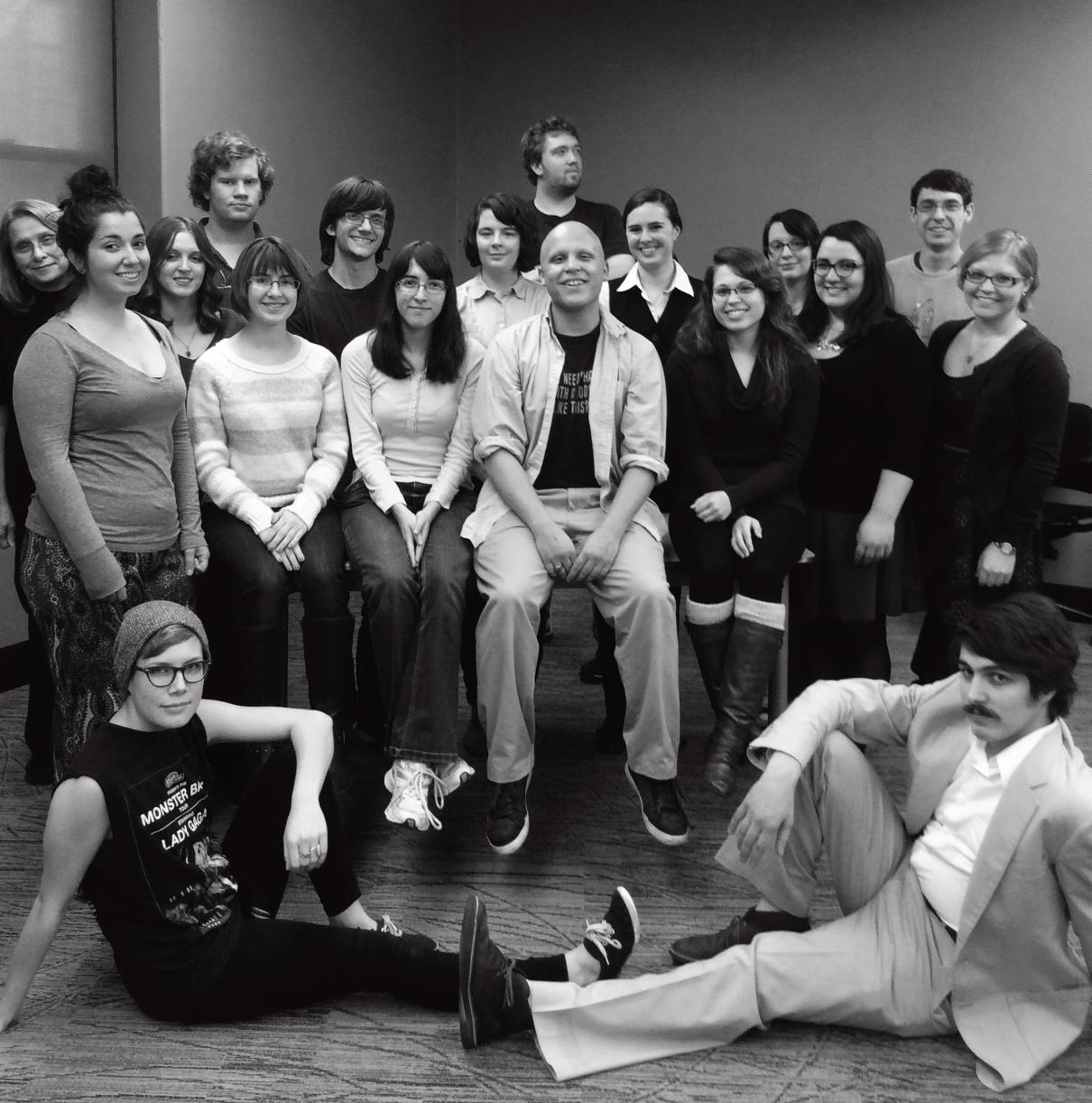
Benoist, Brian E. Pickens, Samantha Kolar, David J. A. Niemann, Sarah C. Gill, Anna Glushko, and Ryan Brooks
Middle Row (L to R): Emma Figueroa, Madison Emerick, Melissa Somerdin, Benjamin Luczak, Nicole Bonsignore, Marie
Kenney, and Bekah Cripe
Front Row (L to R): K atr yn Dierksen and T homas S. Mays
Kaylyn Bauer
Terri Berg
Gabriella Black
Robert Bliss
Ryan Brooks
Abram Brummett
Sean Burkett
Glene G. Carranza
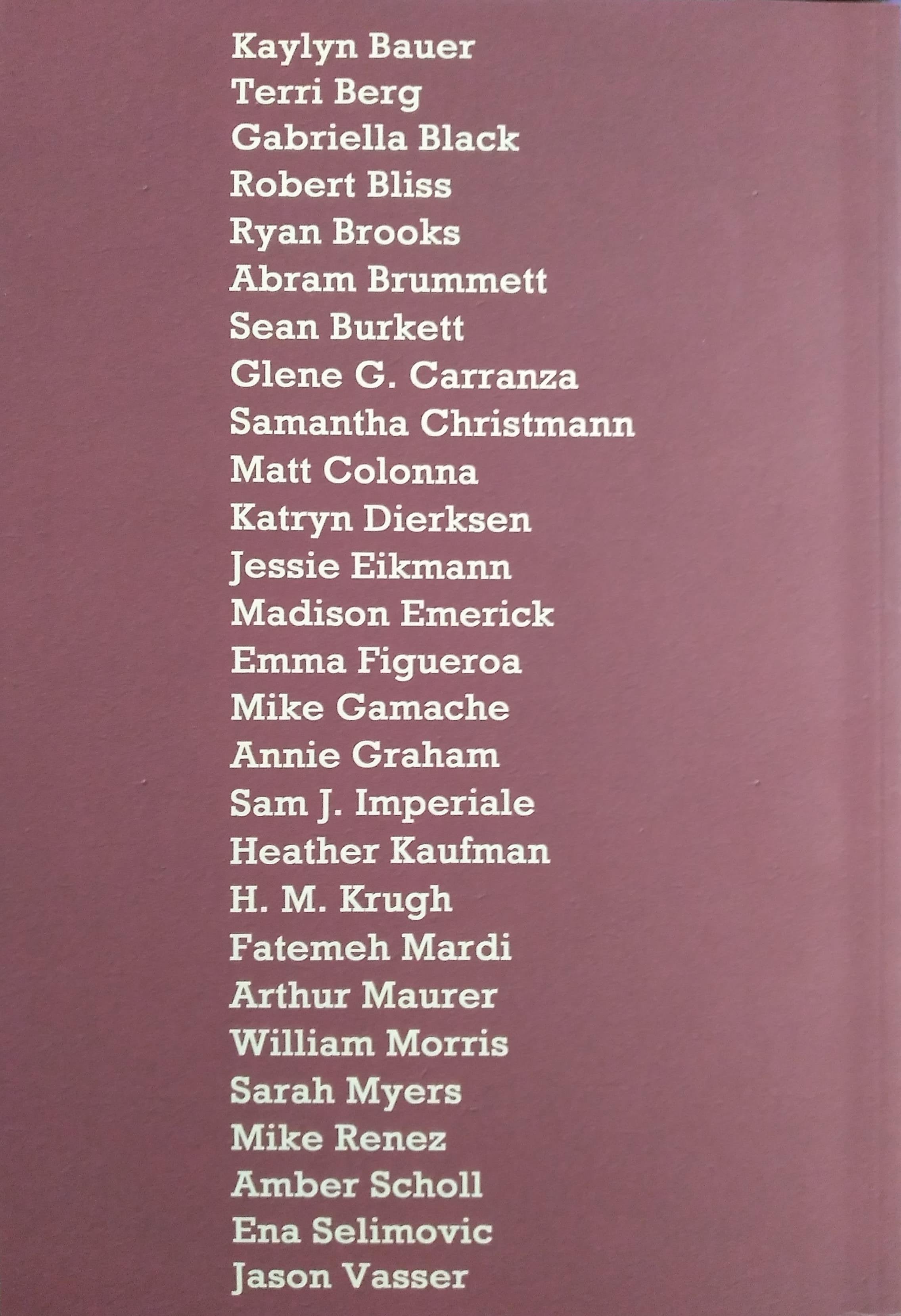
Samantha Christmann
Matt Colonna
Katryn Dierksen
Jessie Eikmann
Madison Emerick
Emma Figueroa
Mike Gamache
Annie Graham
Sam J. Imperiale
Heather Kaufman
H. M. Krugh
Fatemeh Mardi
Arthur Maurer
William Morris
Sarah Myers
Mike Renez
Amber Scholl
Ena Selimovic
Jason Vasser
